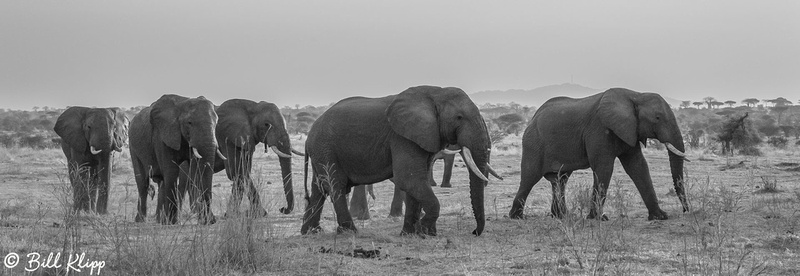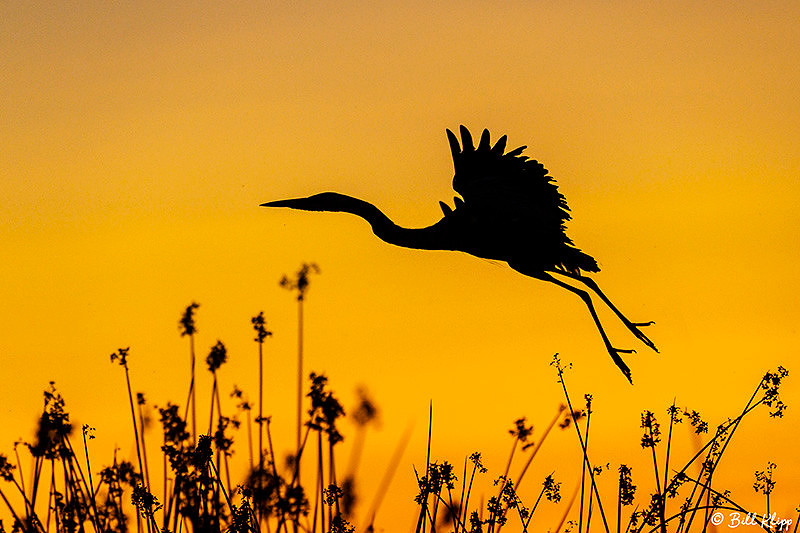 Great Blue Heron Sunset, Delta Wanderings, Discovery Bay, Photos by Bill KlippGreat Blue Heron Sunset, Delta Wanderings, Discovery Bay, Photos by Bill Klipp
Great Blue Heron Sunset, Delta Wanderings, Discovery Bay, Photos by Bill KlippGreat Blue Heron Sunset, Delta Wanderings, Discovery Bay, Photos by Bill Klipp
All photos © Bill Klipp, not for Commercial Use of any type, for personal use only with written permission.
As internationally recognized wildlife photographers my wife Linda and I spend a good portion of the year traveling to remote and exotic locations across our planet. Our travels take us from Antarctica to the high Canadian arctic and many places in between such as Africa, Madagascar, Galapagos and South America to name a few. But when we are back on the Delta we try to Wander about in our boat seeking the many amazing wildlife encounters we have right in our Backyard. The photos in this Blog edition were made over the last month or so during our many “Delta Safari Wine Cruises”. We putt around our local waterways in our pontoon boat armed with several cameras and of course a bottle (or 2) of wine capturing images of the Wildlife that call the Delta their home.
(A periodic photo blog of our Discovery Bay and Delta Wanderings)
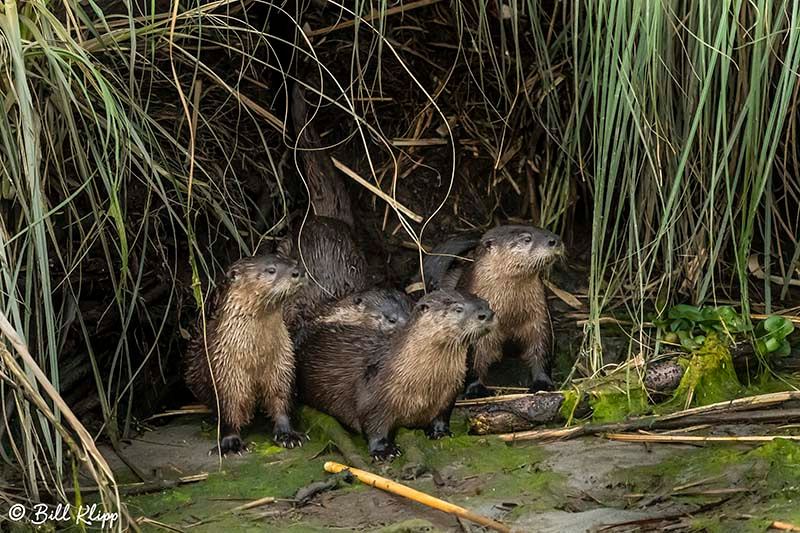 River Otters, Delta Wanderings, Discovery Bay, Photos by Bill KlippRiver Otters, Delta Wanderings, Discovery Bay, Photos by Bill Klipp
River Otters, Delta Wanderings, Discovery Bay, Photos by Bill KlippRiver Otters, Delta Wanderings, Discovery Bay, Photos by Bill Klipp
All photos © Bill Klipp, not for Commercial Use of any type, for personal use only with written permission.
It always amazes us as we sit in our boat focused on say a dozen River Otters gobbling up bright Red Crayfish as many boats just pass by us oblivious to their surroundings. People often say Wow! where did you see this or that? My comment is we are surrounded by terrestrial, aquatic and aerial wildlife you just need to put your cell-phone down be patient and be in the moment and you would be surprised at what you will see. While many of the creatures below may seem common I suspect there are a few that have alluded your gaze.
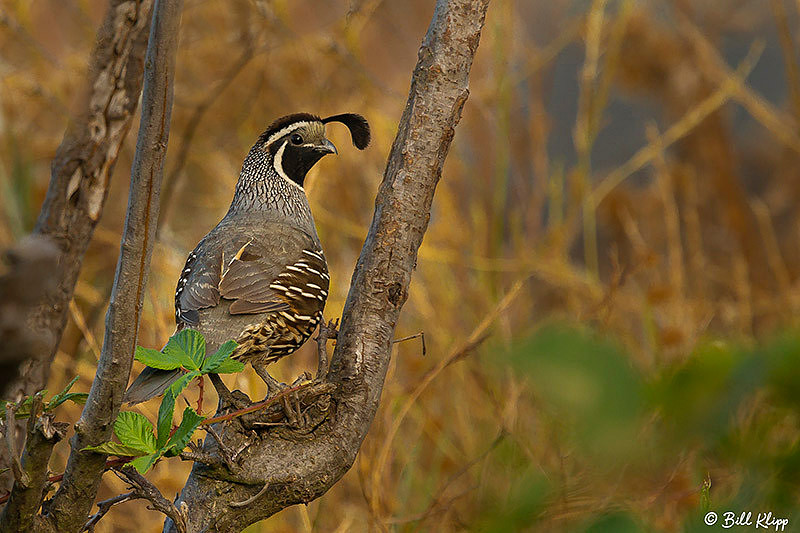 California Quail, Delta Wanderings, Discovery Bay, Photos by Bill KlippCalifornia Quail, Delta Wanderings, Discovery Bay, Photos by Bill Klipp
California Quail, Delta Wanderings, Discovery Bay, Photos by Bill KlippCalifornia Quail, Delta Wanderings, Discovery Bay, Photos by Bill Klipp
All photos © Bill Klipp, not for Commercial Use of any type, for personal use only with written permission.
California Quail (male), is a ground dwelling bird often seen scurrying along the levee tops or perched on fence posts and are usually found in small groups called "Coveys". California Quail’s main call consists of three syllables and high pitched sounds like the bird is saying Chi-ca-go. It’s usually given when an individual is separated from its group or mate, as well as while a covey is on the move or preparing to move. The males have a "comma" shaped crest and strong head markings.
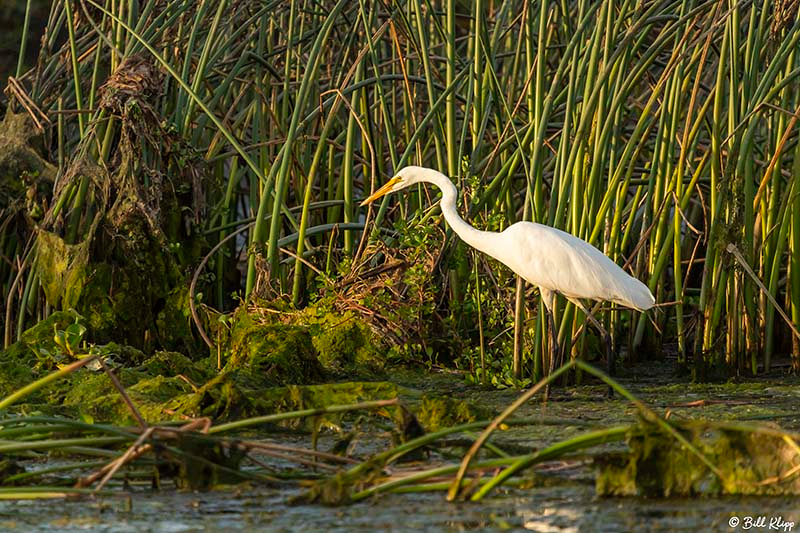 Great Egret, Delta Wanderings, Discovery Bay, Photos by Bill KlippGreat Egret, Delta Wanderings, Discovery Bay, Photos by Bill Klipp
Great Egret, Delta Wanderings, Discovery Bay, Photos by Bill KlippGreat Egret, Delta Wanderings, Discovery Bay, Photos by Bill Klipp
All photos © Bill Klipp, not for Commercial Use of any type, for personal use only with written permission.
As the waters recede during low tides, the Delta takes on a different look sometimes revealing previously hidden things like sand bars, old pylons, tree limbs and sometimes junk, like old submerged car tires. What is most interesting though is the emergence of a totally new shoreline exposing mudflats teaming with life. Fish get trapped in small pools of water, invertebrates like crayfish and small crabs scurry about creating a potential feast for the many creatures and shore birds found in our Delta backyards.
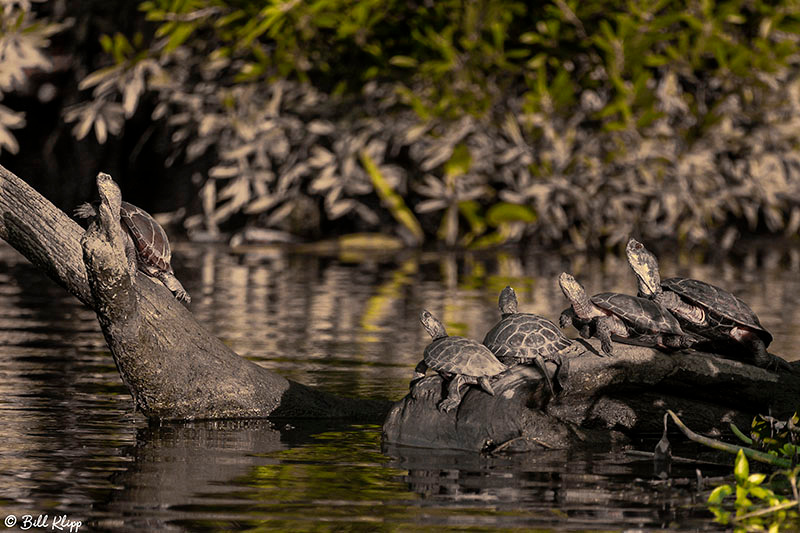 Western Pond Turtle, Delta Wanderings, Discovery Bay, Photos byWestern Pond Turtle, Delta Wanderings, Discovery Bay, Photos by Bill Klipp
Western Pond Turtle, Delta Wanderings, Discovery Bay, Photos byWestern Pond Turtle, Delta Wanderings, Discovery Bay, Photos by Bill Klipp
All photos © Bill Klipp, not for Commercial Use of any type, for personal use only with written permission.
The Western Pond Turtle is the West Coast's only native freshwater Turtle and is close to be included on the Endangered Species list. Recently we counted 14 of them in a backwater slough near Discovery Bay. Did you know that a group of Turtles is called a "Bale" or a "Herd"?
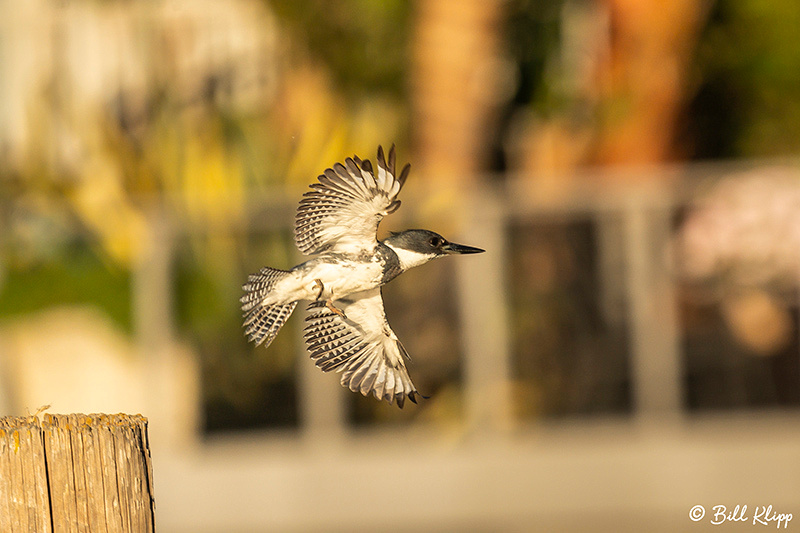 Belted Kingfisher, Delta Wanderings, Discovery Bay, Photos by Bill KlippBelted Kingfisher, Delta Wanderings, Discovery Bay, Photos by Bill Klipp
Belted Kingfisher, Delta Wanderings, Discovery Bay, Photos by Bill KlippBelted Kingfisher, Delta Wanderings, Discovery Bay, Photos by Bill Klipp
All photos © Bill Klipp, not for Commercial Use of any type, for personal use only with written permission.
Belted Kingfisher (male), these guys will hang out on branches or posts along the water's edge waiting to plunge into the water to grab a fish. They are most often found first by hearing their wild rattling call which is often described as a machine gun. Males have a crest and are blue/grey with a white collar, while the females have a chestnut colored belly band and flanks. They have a wide distribution across North America.
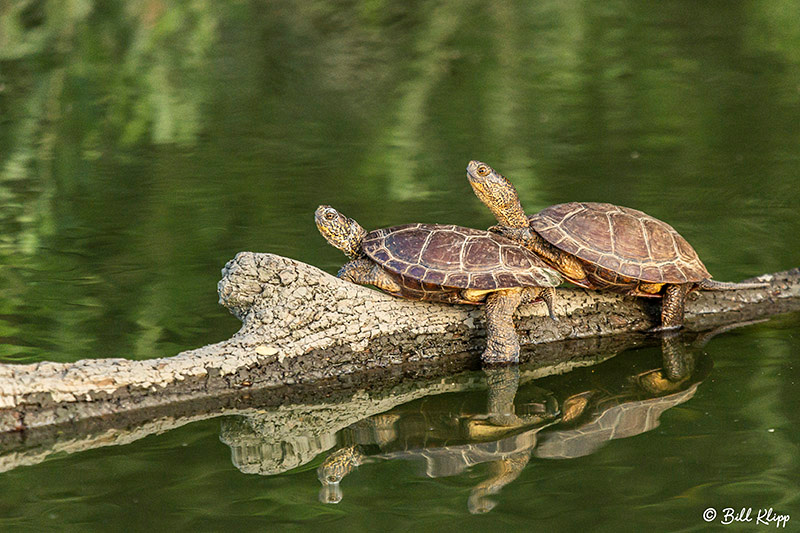 Western Pond Turtle, Delta Wanderings, Discovery Bay, Photos byWestern Pond Turtle, Delta Wanderings, Discovery Bay, Photos by Bill Klipp
Western Pond Turtle, Delta Wanderings, Discovery Bay, Photos byWestern Pond Turtle, Delta Wanderings, Discovery Bay, Photos by Bill Klipp
All photos © Bill Klipp, not for Commercial Use of any type, for personal use only with written permission.
Western Pond Turtles, often hard to find as they are mostly in the back sloughs away from people and boat traffic. To see them you need to look far ahead of you along the shoreline and look for logs, rocks, stumps and other obstructions protruding from the water. You might be rewarded with a glimpse of a couple sunbathing
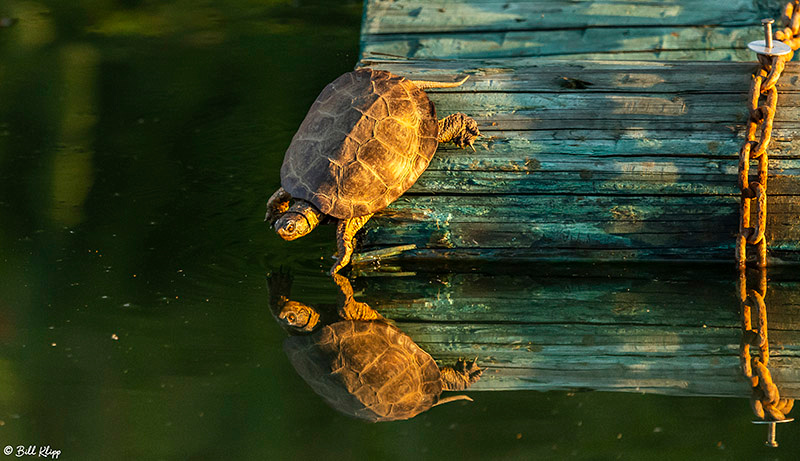 Western Pond Turtle, Delta Wanderings, Discovery Bay, Photos byWestern Pond Turtle, Delta Wanderings, Discovery Bay, Photos by Bill Klipp
Western Pond Turtle, Delta Wanderings, Discovery Bay, Photos byWestern Pond Turtle, Delta Wanderings, Discovery Bay, Photos by Bill Klipp
All photos © Bill Klipp, not for Commercial Use of any type, for personal use only with written permission.
Western Pond Turtle, the west coast's only native freshwater turtle. They are opportunistic omnivores with a regular diet of invertebrates, fishes, amphibian eggs and young, and carrion.
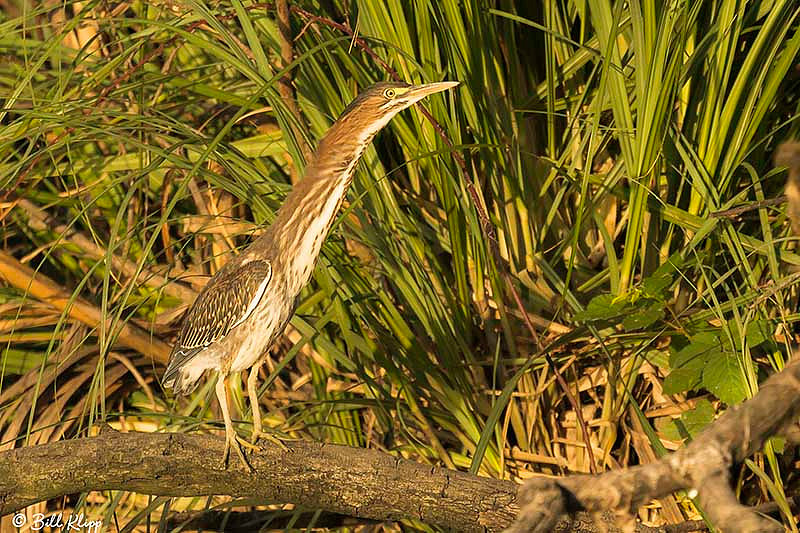 Green Heron, Delta Wanderings, Discovery Bay, Photos by Bill KlippGreen Heron, Delta Wanderings, Discovery Bay, Photos by Bill Klipp
Green Heron, Delta Wanderings, Discovery Bay, Photos by Bill KlippGreen Heron, Delta Wanderings, Discovery Bay, Photos by Bill Klipp
All photos © Bill Klipp, not for Commercial Use of any type, for personal use only with written permission.
Green Herons are one of the world's few tool-using bird species sometimes seen using twigs, feathers or insects as a lure or bait to attract a fish which they catch with a lightening like stab with their dagger-like bill. They tend to hang out along the edge of shallow water or hidden in vegetation on the shoreline and are often hard to see at first. Normally they are a stocky looking bird although the one above has extended it's neck as it looks for prey.
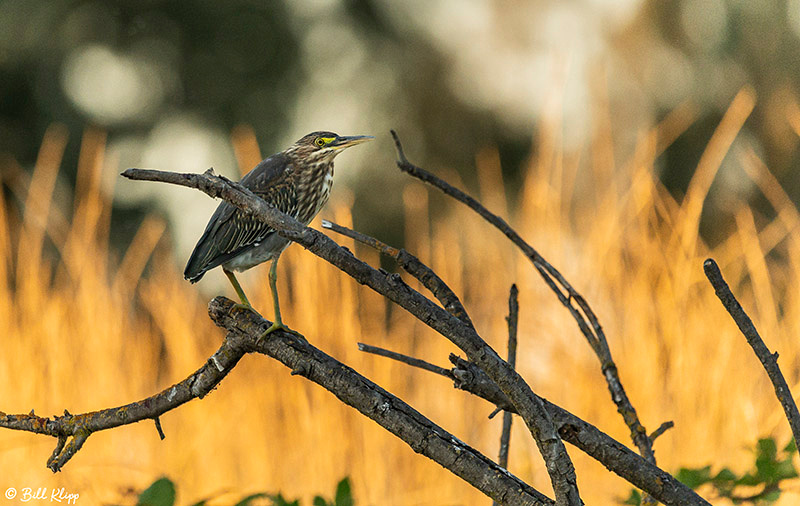 Delta Wanderings, Photos by Bill KlippDelta Wanderings, Photos by Bill Klipp
Delta Wanderings, Photos by Bill KlippDelta Wanderings, Photos by Bill Klipp
All photos © Bill Klipp, not for Commercial Use of any type, for personal use only.
Juvenile Green Heron
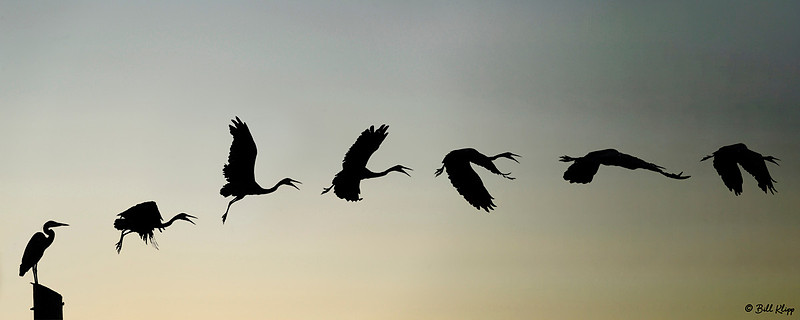 Great Blue Heron, Delta Wanderings, Discovery Bay, Photos by Bill KlippGreat Blue Heron, Delta Wanderings, Discovery Bay, Photos by Bill Klipp
Great Blue Heron, Delta Wanderings, Discovery Bay, Photos by Bill KlippGreat Blue Heron, Delta Wanderings, Discovery Bay, Photos by Bill Klipp
All photos © Bill Klipp, not for Commercial Use of any type, for personal use only with written permission.
Great Blue Heron taking off. Composite image composed of 7 photos
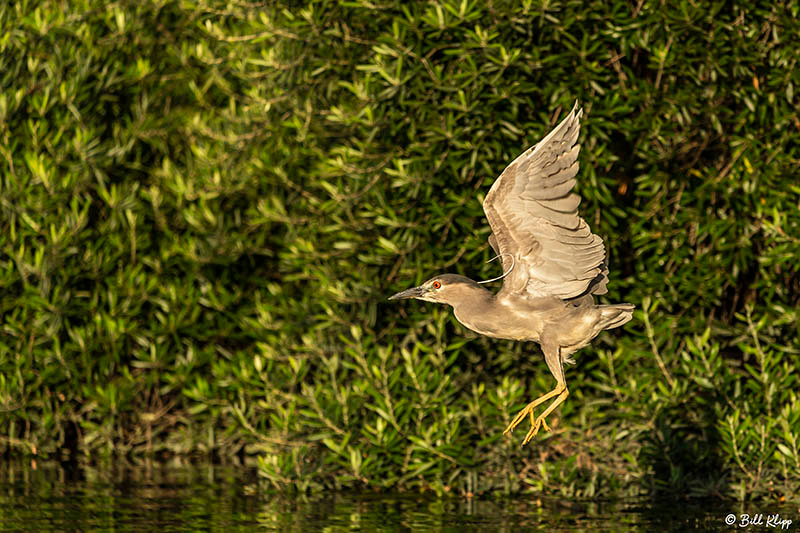 Night Heron, Delta Wanderings, Discovery Bay, Photos by Bill KlippNight Heron, Delta Wanderings, Discovery Bay, Photos by Bill Klipp
Night Heron, Delta Wanderings, Discovery Bay, Photos by Bill KlippNight Heron, Delta Wanderings, Discovery Bay, Photos by Bill Klipp
All photos © Bill Klipp, not for Commercial Use of any type, for personal use only with written permission.
Black Crowned Night Heron, medium sized Heron chunkier than their other longer legged Heron cousins, these guys are most active at night or dusk. They have grey and black plumage with long white head plumes. Feeds mostly on fish, crustaceans, insects, frogs and snakes.
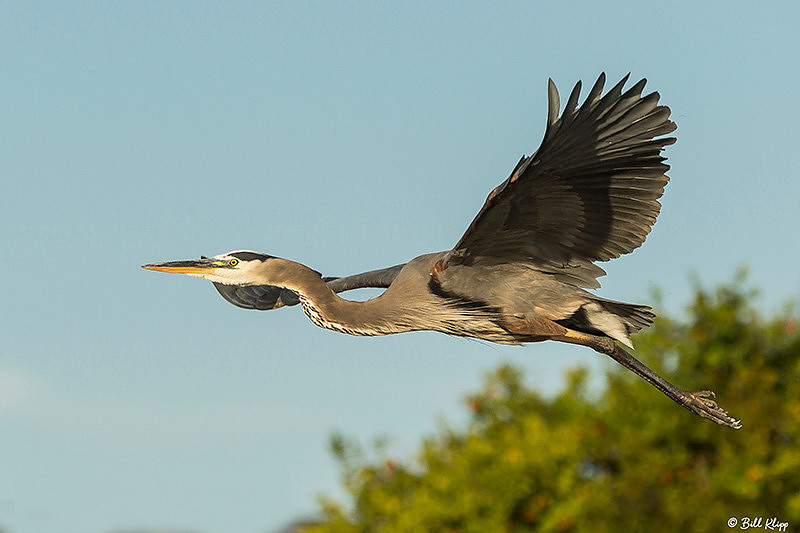 Great Blue Heron, Delta Wanderings, Discovery Bay, Photos by Bill KlippGreat Blue Heron, Delta Wanderings, Discovery Bay, Photos by Bill Klipp
Great Blue Heron, Delta Wanderings, Discovery Bay, Photos by Bill KlippGreat Blue Heron, Delta Wanderings, Discovery Bay, Photos by Bill Klipp
All photos © Bill Klipp, not for Commercial Use of any type, for personal use only with written permission.
Great Blue Heron, the largest of our local birds found throughout the delta and North and South America. This majestic bird with its blue-gray plumage will often stand motionless as it scans for prey. They strike their prey with lightening speed with a diet ranging from fish, crayfish, insects, ducklings and even small gophers and rodents.
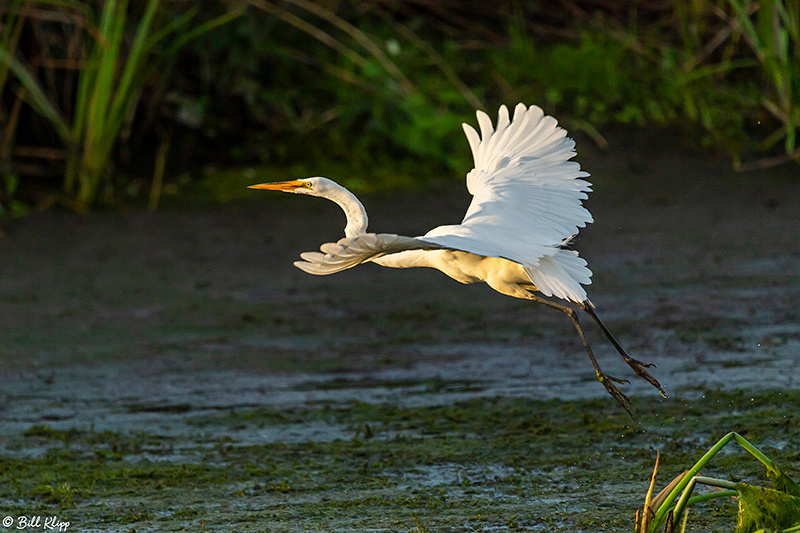 Great Egret, Delta Wanderings, Discovery Bay, Photos by Bill KlippGreat Egret, Delta Wanderings, Discovery Bay, Photos by Bill Klipp
Great Egret, Delta Wanderings, Discovery Bay, Photos by Bill KlippGreat Egret, Delta Wanderings, Discovery Bay, Photos by Bill Klipp
All photos © Bill Klipp, not for Commercial Use of any type, for personal use only with written permission.
Great Egret a tall stately wading Egret that forages mostly by standing or walking in shallow calm waters. In addition to fish its main diet includes crustaceans, insects, frogs and snakes. You will often see them feeding alongside other Egrets and Herons. The telltale difference vs the smaller Snowy Egret is their black legs and feet and yellow bill.
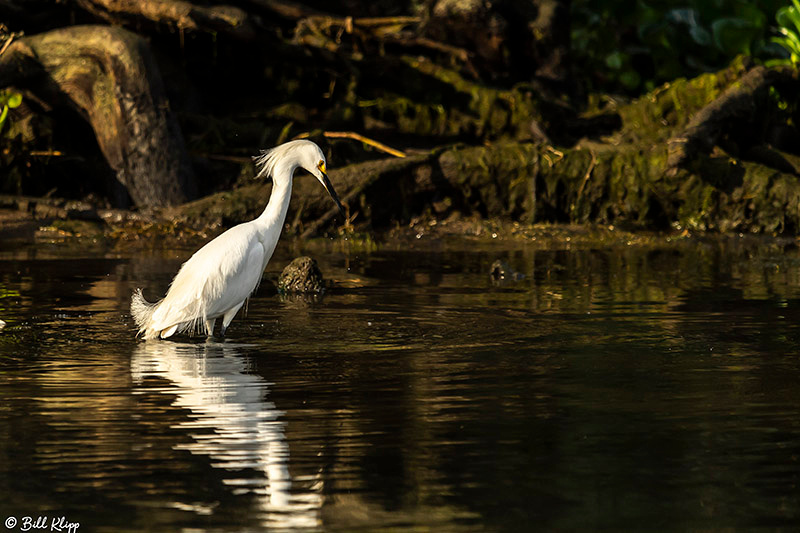 Snowy Egret, Delta Wanderings, Discovery Bay, Photos by Bill KlippSnowy Egret, Delta Wanderings, Discovery Bay, Photos by Bill Klipp
Snowy Egret, Delta Wanderings, Discovery Bay, Photos by Bill KlippSnowy Egret, Delta Wanderings, Discovery Bay, Photos by Bill Klipp
All photos © Bill Klipp, not for Commercial Use of any type, for personal use only with written permission.
Snowy Egret, a smallish beautiful Egret with very active feeding behavior sometimes walking running or stirring the muddy bottom with its distinctive yellow feet to stir up prey. Notice the black bill and yellow lore vs the above Great Egret's colors.
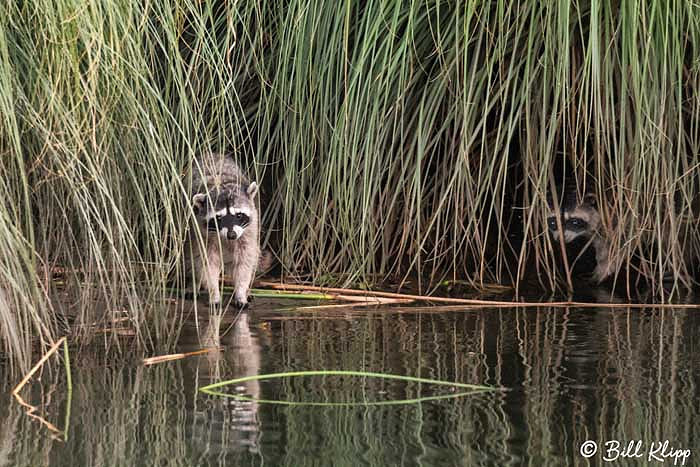 Discovery Bay, Photos by Bill KlippRaccoon, Discovery Bay, Photos by Bill Klipp
Discovery Bay, Photos by Bill KlippRaccoon, Discovery Bay, Photos by Bill Klipp
Mammals_Disco_Bay_Raccoon_BKlipp_July_2018_9_.NEF
All photos © Bill Klipp, not for Commercial Use of any type, for personal use only.
We were cruising down Indian slough just before sunset when we heard screaming sounds coming from the tulee island, sounded like a cat fight. We speculated it was raccoons and a few minutes later we spotted two of them near the water’s edge
 Raccoon, Discovery Bay Photos by Bill KlippRaccoon, Discovery Bay Photos by Bill Klipp
Raccoon, Discovery Bay Photos by Bill KlippRaccoon, Discovery Bay Photos by Bill Klipp
All photos © Bill Klipp, not for Commercial Use of any type, for personal use only.
Some of our tulee islands are home to Raccoons, who swim to our shores at night often on garbage pickup days
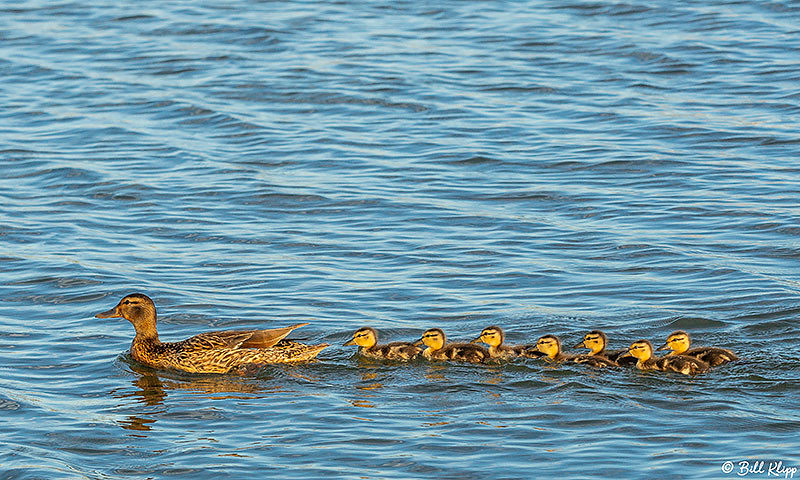 Mallard Ducks, Delta Wanderings, Discovery Bay, Photos by Bill KlippMallard Ducks, Wanderings, Discovery Bay, Photos by Bill Klipp
Mallard Ducks, Delta Wanderings, Discovery Bay, Photos by Bill KlippMallard Ducks, Wanderings, Discovery Bay, Photos by Bill Klipp
All photos © Bill Klipp, not for Commercial Use of any type, for personal use only with written permission.
Mallard Duck (female) with it's brood of ducklings. The most abundant Duck species across the planet. While they are omnivorous the majority of their diet is plant material.
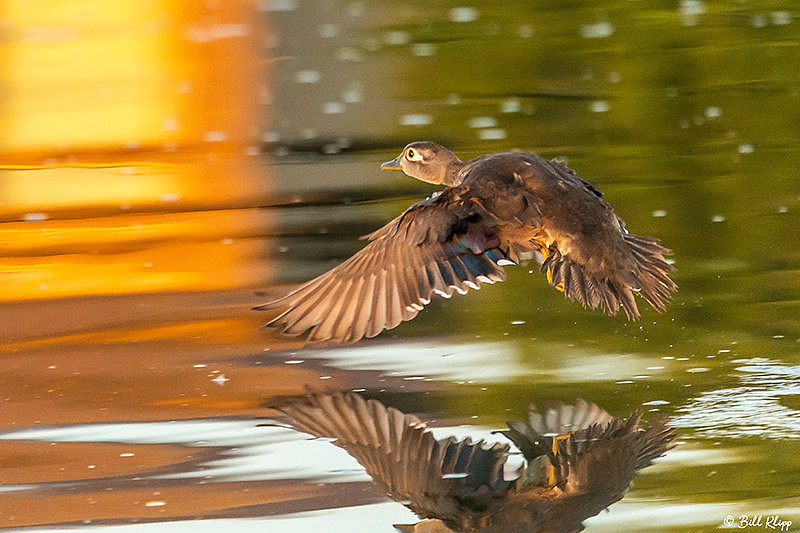 Wood Ducks, Delta Wanderings, Discovery Bay, Photos by Bill KlippWood Ducks, Delta Wanderings, Discovery Bay, Photos by Bill Klipp
Wood Ducks, Delta Wanderings, Discovery Bay, Photos by Bill KlippWood Ducks, Delta Wanderings, Discovery Bay, Photos by Bill Klipp
All photos © Bill Klipp, not for Commercial Use of any type, for personal use only with written permission.
Wood Duck (female), one of the most pretty Duck species. The females have a delicate white pattern around the eyes while the males are iridescent chestnut and green with ornate patterns on their feathers. They nest in trees and bushes near water and is the only North American Duck that has 2 broods per year.
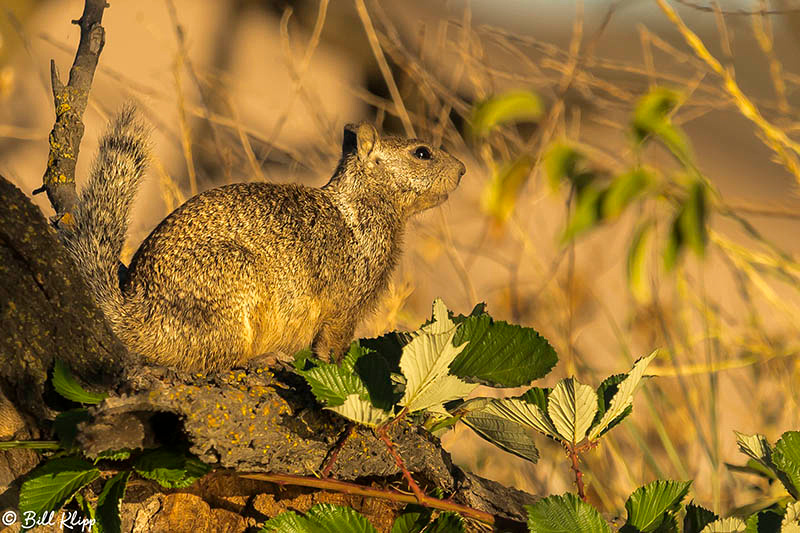 Ground Squirrel, Delta Wanderings, Discovery Bay, Photos by Bill KlippGround Squirrel, Delta Wanderings, Discovery Bay, Photos by Bill Klipp
Ground Squirrel, Delta Wanderings, Discovery Bay, Photos by Bill KlippGround Squirrel, Delta Wanderings, Discovery Bay, Photos by Bill Klipp
All photos © Bill Klipp, not for Commercial Use of any type, for personal use only with written permission.
Ground Squirrels, these guys are pretty common on our back roads, you will often see them darting across Marsh Creek Road. They also travel along the farmland levees. But they are quick and stealthy as they are always on the look out for predators like Hawks and Great Horned Owls.
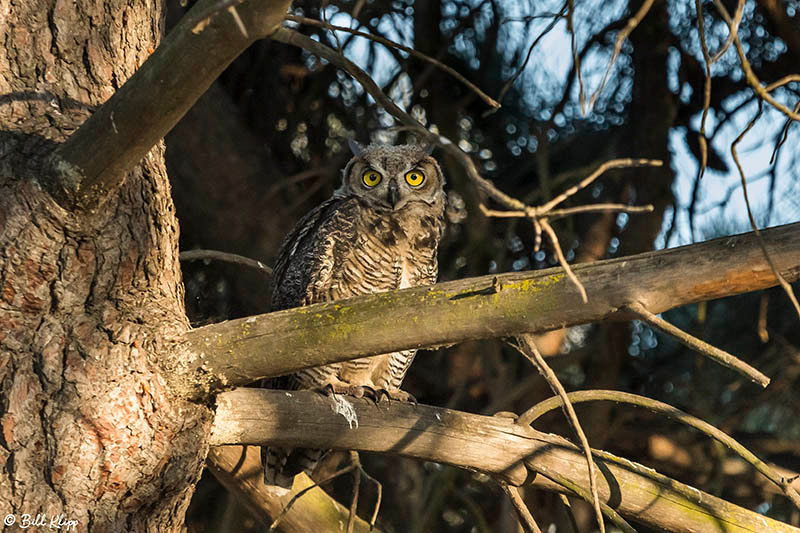 Great Horned Owl, Delta Wanderings, Discovery Bay, Photos by BilGreat Horned Owl, Delta Wanderings, Discovery Bay, Photos by Bill Klipp
Great Horned Owl, Delta Wanderings, Discovery Bay, Photos by BilGreat Horned Owl, Delta Wanderings, Discovery Bay, Photos by Bill Klipp
All photos © Bill Klipp, not for Commercial Use of any type, for personal use only with written permission.
Great Horned Owl, very hard to find in daytime as they are well camouflaged and stay deep inside big tree branches usually near the main tree trunk. A powerful aerial predator fond of birds and small mammals such as mice, squirrels and rabbits, although they also dine on scorpions and other insects. Common throughout North America and Mexico.
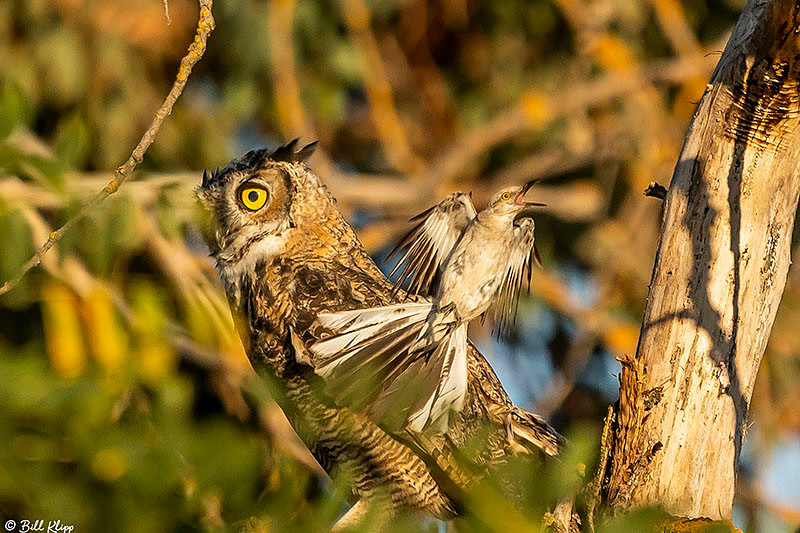 Great Horned Owl, Delta Wanderings, Discovery Bay, Photos by BilGreat Horned Owl, Delta Wanderings, Discovery Bay, Photos by Bill Klipp
Great Horned Owl, Delta Wanderings, Discovery Bay, Photos by BilGreat Horned Owl, Delta Wanderings, Discovery Bay, Photos by Bill Klipp
All photos © Bill Klipp, not for Commercial Use of any type, for personal use only with written permission.
Creatures of Habit
We are often asked how do we find all these creatures? Well first of all we are always looking and in many cases animals are creatures of habit. By observing them over time you learn their habits their routes or trails, where they like to hang out or roost, where their dens or nests are, at what time of day or tide levels they are most active, what they eat. Generally speaking once you understand their behaviors and the ecology they live in it’s actually pretty easy to find them. Sometimes just listening is what tips us off. Great Horned Owls are masters of camouflage but if you know their calls that helps tip you off to what tree they might be in. Then knowing they often like to perch right next to the tree’s main trunk helps narrow down your search. Or in the case above we heard the loud repetitive alarm calls of a Mockingbird which tipped us off that they where very upset. The question then is what is upsetting them? As we followed the alarm calls we found an Owl being harassed by a couple of Mockingbirds who didn’t like the Owl being in “their” tree. The Mockingbirds would repeatedly attack the Owl by flying at it and trying to peck it. The Owl was largely unphased though.
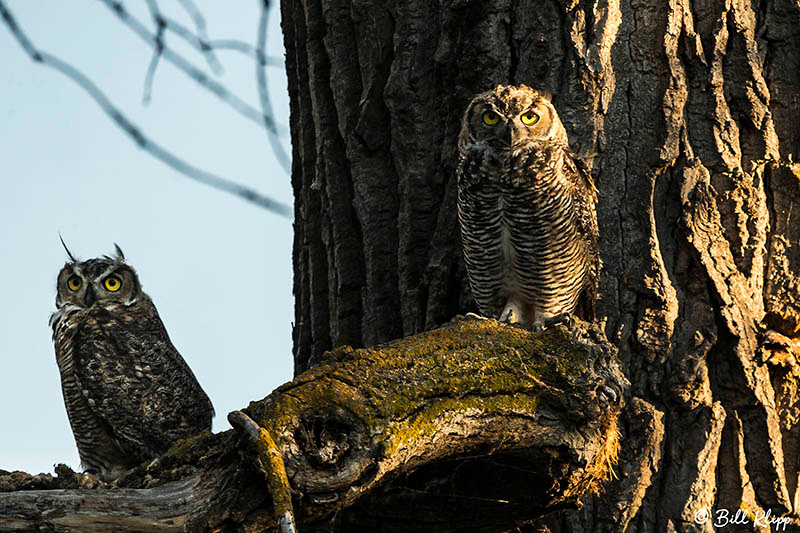 Discovery Bay Photos by Bill KlippDiscovery Bay Photos by Bill Klipp
Discovery Bay Photos by Bill KlippDiscovery Bay Photos by Bill Klipp
All photos © Bill Klipp, not for Commercial Use of any type, for personal use only with written permission.
Great Horned Owls
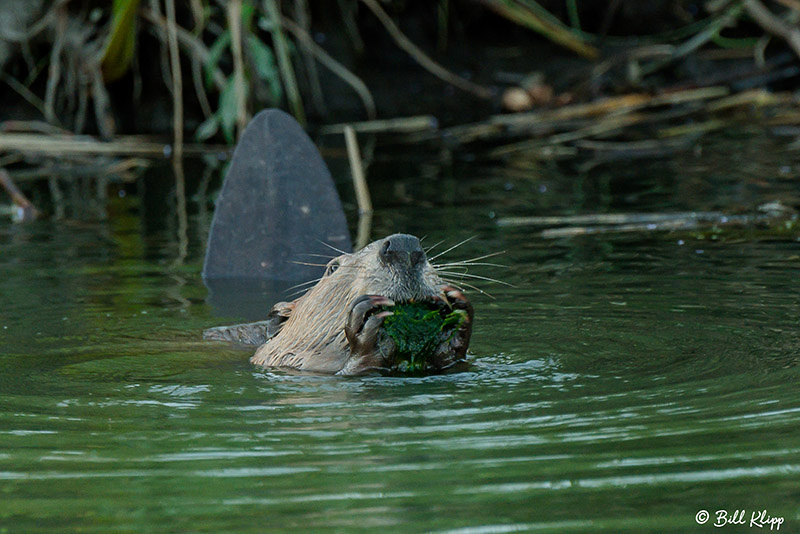 Beaver, Indian Slough, Discovery Bay Photos by Bill KlippBeaver, Indian Slough, Discovery Bay Photos by Bill Klipp
Beaver, Indian Slough, Discovery Bay Photos by Bill KlippBeaver, Indian Slough, Discovery Bay Photos by Bill Klipp
All photos © Bill Klipp, not for Commercial Use of any type, for personal use only.
The Beaver is our largest aquatic mammal, much bigger than River Otters and Muskrats. They have a large ears, a triangular head, roundish body and large flat platter like hairless tail. They are 3-4 feet long and weigh a substantial 24-70 lbs. They are herbivores feasting on many types of plant materials.
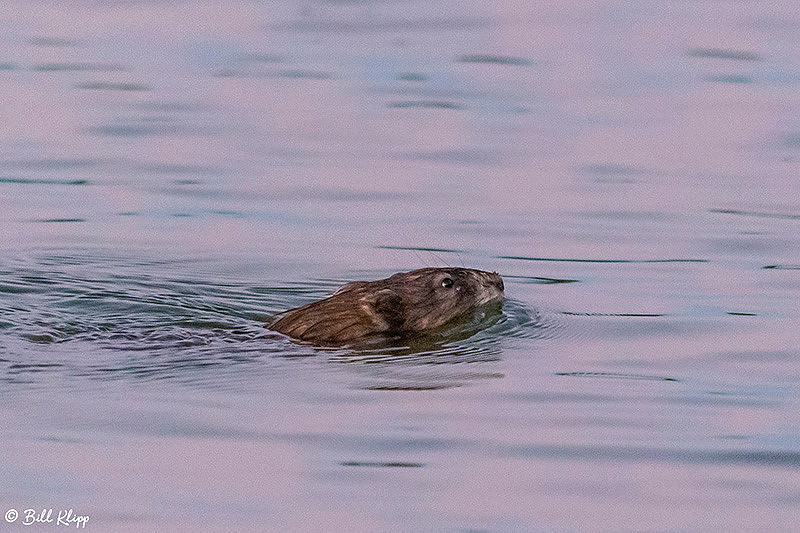 Beaver, Indian Slough, Delta Wanderings, Photos by Bill KlippBeaver, Indian Slough, Delta Wanderings, Photos by Bill Klipp
Beaver, Indian Slough, Delta Wanderings, Photos by Bill KlippBeaver, Indian Slough, Delta Wanderings, Photos by Bill Klipp
All photos © Bill Klipp, not for Commercial Use of any type, for personal use only.
Notice the Beaver's triangular head and large ears
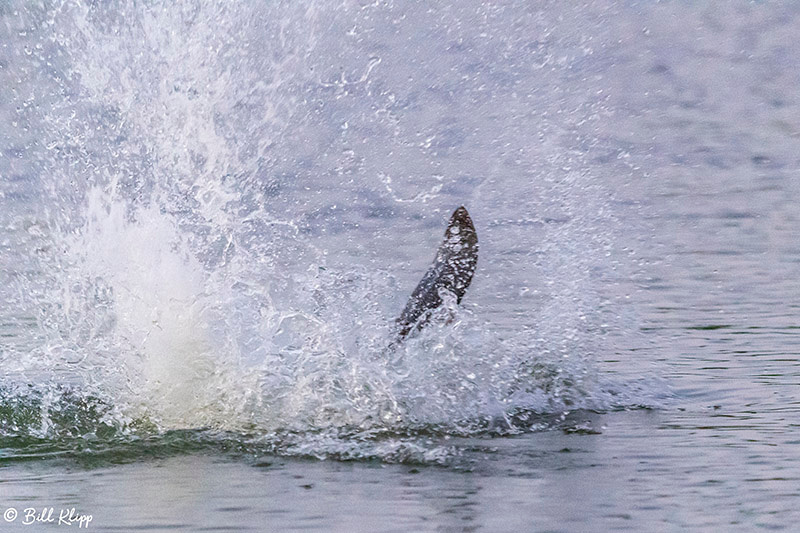 Beaver, Indian Slough, Delta Wanderings, Photos by Bill KlippBeaver, Indian Slough, Delta Wanderings, Photos by Bill Klipp
Beaver, Indian Slough, Delta Wanderings, Photos by Bill KlippBeaver, Indian Slough, Delta Wanderings, Photos by Bill Klipp
All photos © Bill Klipp, not for Commercial Use of any type, for personal use only.
When Beavers are startled or when they want to send a message like you are in my territory they will make a large tail slap on the surface of the water just as they dive below.
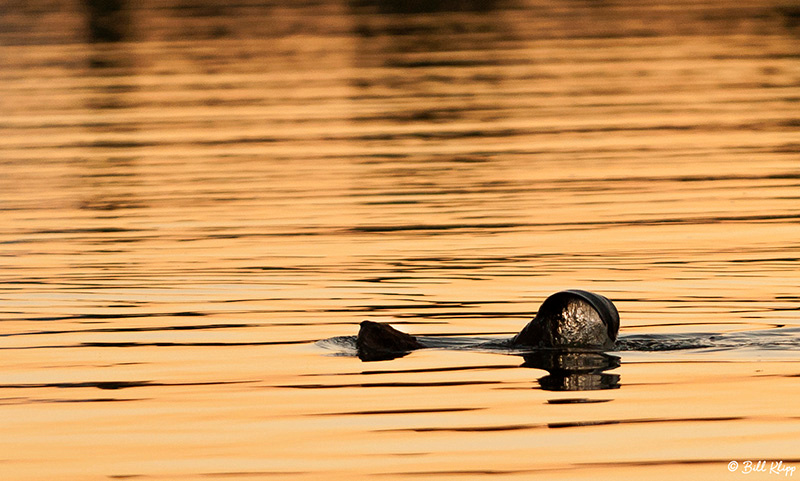 Discovery Bay photos by Bill KlippDiscovery Bay photos by Bill Klipp
Discovery Bay photos by Bill KlippDiscovery Bay photos by Bill Klipp
Beaver are primarily nocturnal and are more easily seen at dusk
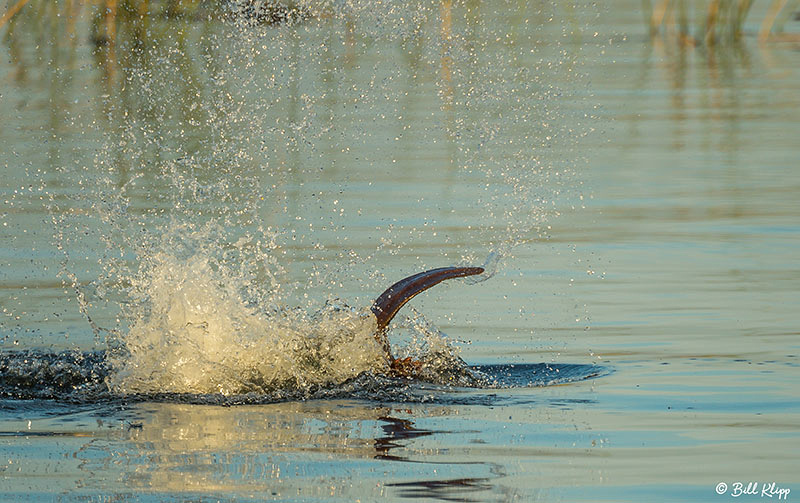 Discovery Bay Photos by Bill KlippAll photos © Bill Klipp, not for Commercial Use of any type, for personal use only.
Discovery Bay Photos by Bill KlippAll photos © Bill Klipp, not for Commercial Use of any type, for personal use only.
Beaver
Discovery Bay Photos by Bill Klipp
Beaver tail slap
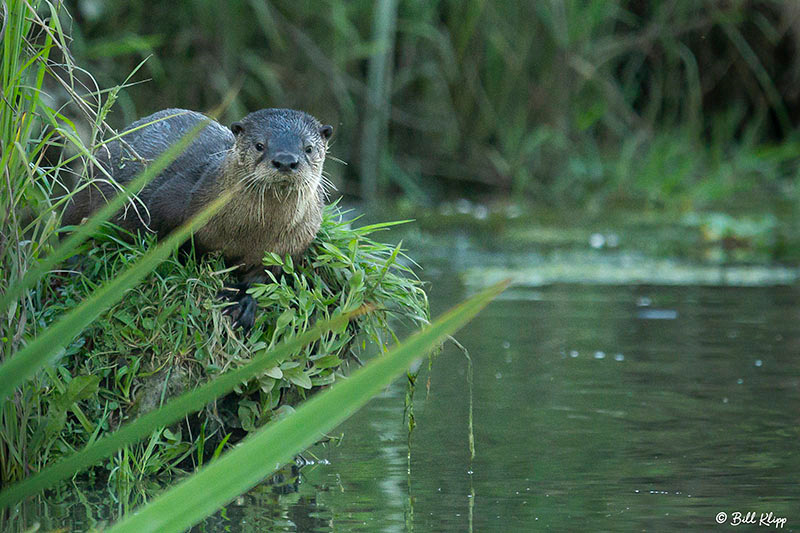 Delta Wanderings, Discovery Bay, Photos by Bill KlippDelta Wanderings, Discovery Bay, Photos by Bill Klipp
Delta Wanderings, Discovery Bay, Photos by Bill KlippDelta Wanderings, Discovery Bay, Photos by Bill Klipp
All photos © Bill Klipp, not for Commercial Use of any type, for personal use only with written permission.
River Otters are probably our most common aquatic mammal.
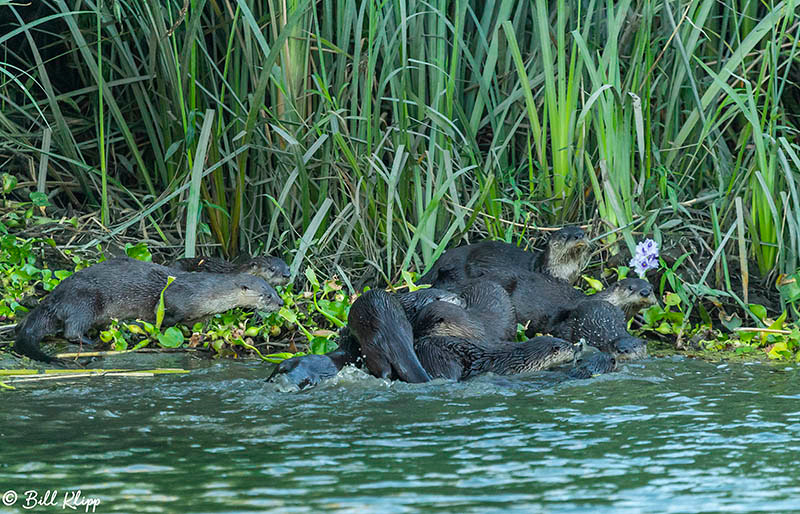 River Otters, Indian Slough, Delta Wanderings, Photos by Bill KlippRiver Otters, Indian Slough, Delta Wanderings, Photos by Bill Klipp
River Otters, Indian Slough, Delta Wanderings, Photos by Bill KlippRiver Otters, Indian Slough, Delta Wanderings, Photos by Bill Klipp
All photos © Bill Klipp, not for Commercial Use of any type, for personal use only.
I counted 11, but there could have been more. We followed a bevy of 6 River Otters as they were feeding on dozens of bright red Crayfish along the tulees when they bumped into another bevy of 5-6 Otters coming from the other direction. On a small beach a playful scene unfolded as 11 or so Otters rolled around climbing and playing with each other. This was the single biggest "romp" of River Otters we have ever seen. I would have to say the Otter population around Discovery Bay is very healthy. After a few minutes the groups headed off in different directions as we followed the second group for another 20 minutes.
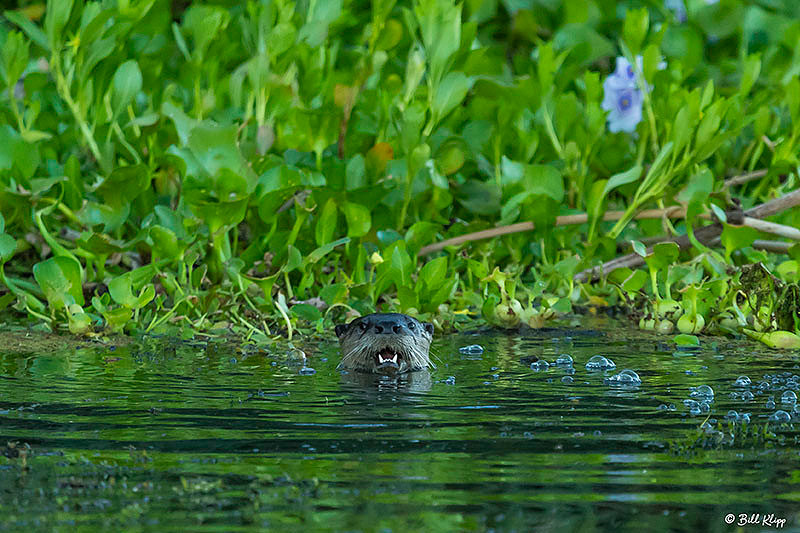 River Otters, Indian Slough, Delta Wanderings, Photos by Bill KlippRiver Otters, Indian Slough, Delta Wanderings, Photos by Bill Klipp
River Otters, Indian Slough, Delta Wanderings, Photos by Bill KlippRiver Otters, Indian Slough, Delta Wanderings, Photos by Bill Klipp
All photos © Bill Klipp, not for Commercial Use of any type, for personal use only.
Young River Otters are very curious and will often check you out
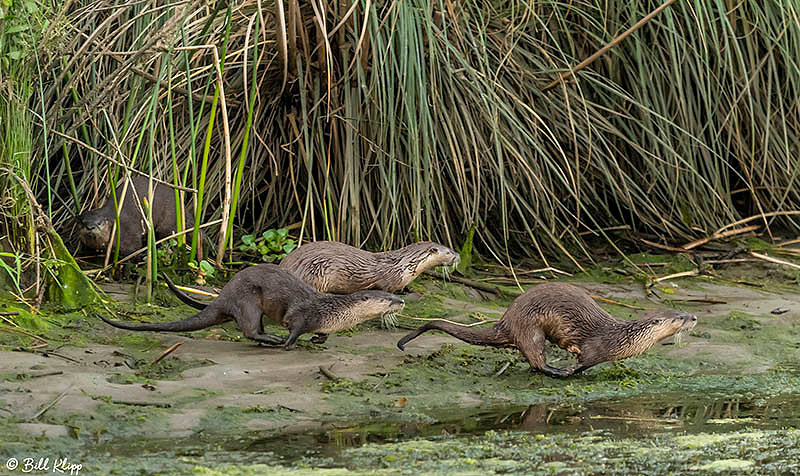 River Otters, Delta Wanderings, Discovery Bay, Photos by Bill KlippRiver Otters, Delta Wanderings, Discovery Bay, Photos by Bill Klipp
River Otters, Delta Wanderings, Discovery Bay, Photos by Bill KlippRiver Otters, Delta Wanderings, Discovery Bay, Photos by Bill Klipp
All photos © Bill Klipp, not for Commercial Use of any type, for personal use only with written permission.
A group of River Otters is called a: "Bevy', "Lodge", "Family", "Raft" or as their energy level and antics might suggest, a "Romp".Recently we followed a mom and her 5 curious pups for over 45 minutes as they swam, played on the mud flats and crunched dozens of Crayfish in one slough near Discovery Bay. It was low tide making for the best time to observe these playful animals.
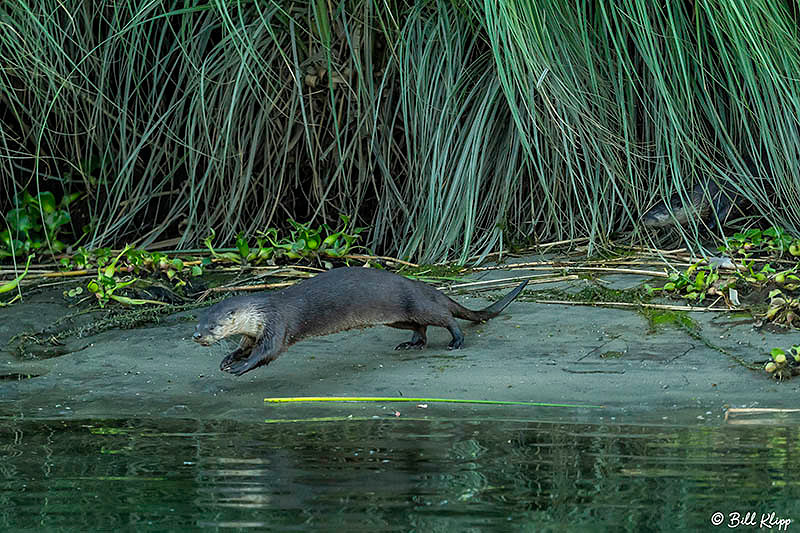 River Otters, Indian Slough, Delta Wanderings, Photos by Bill KlippRiver Otters, Indian Slough, Delta Wanderings, Photos by Bill Klipp
River Otters, Indian Slough, Delta Wanderings, Photos by Bill KlippRiver Otters, Indian Slough, Delta Wanderings, Photos by Bill Klipp
All photos © Bill Klipp, not for Commercial Use of any type, for personal use only.
At low tide you might see our River Otters darting from tunnels in the tulees to the water's edge. Like our Beavers and Muskrats, River Otters live in dens dug into the mud banks of the delta.
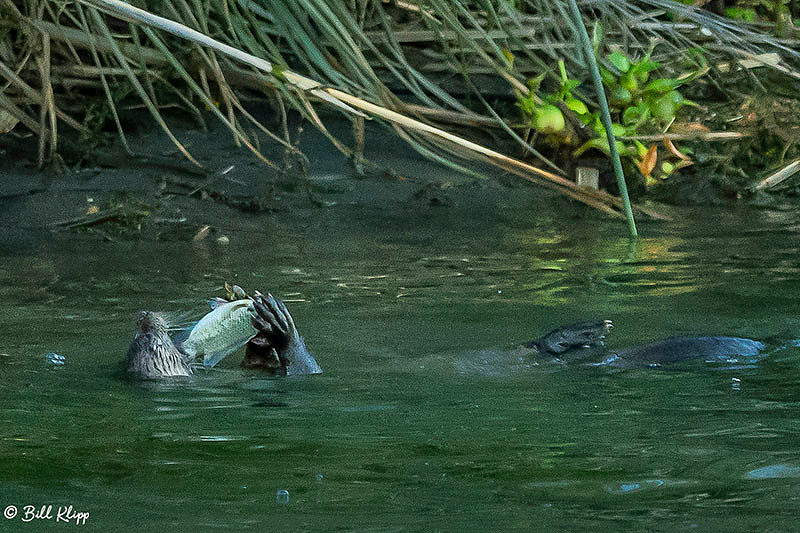 River Otters, Indian Slough, Delta Wanderings, Photos by Bill KlippRiver Otters, Indian Slough, Delta Wanderings, Photos by Bill Klipp
River Otters, Indian Slough, Delta Wanderings, Photos by Bill KlippRiver Otters, Indian Slough, Delta Wanderings, Photos by Bill Klipp
All photos © Bill Klipp, not for Commercial Use of any type, for personal use only.
Classic Otter pose, laying on it's back while eating
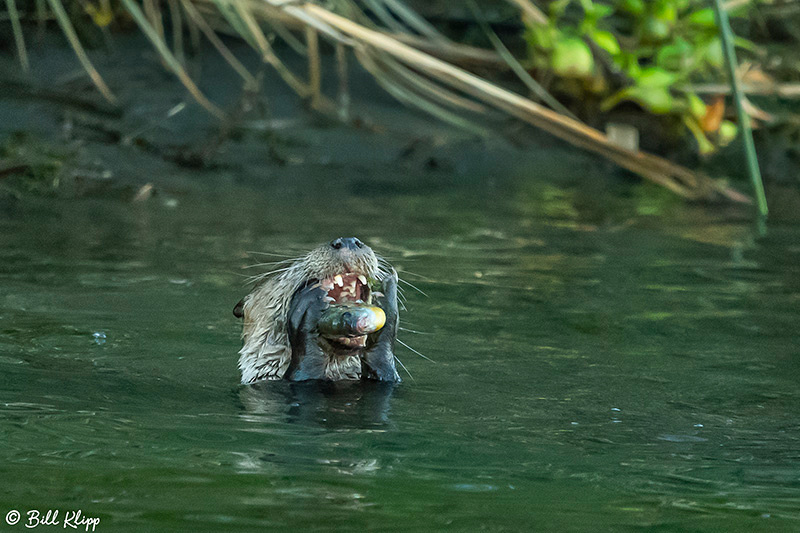 River Otters, Indian Slough, Delta Wanderings, Photos by Bill KlippRiver Otters, Indian Slough, Delta Wanderings, Photos by Bill Klipp
River Otters, Indian Slough, Delta Wanderings, Photos by Bill KlippRiver Otters, Indian Slough, Delta Wanderings, Photos by Bill Klipp
All photos © Bill Klipp, not for Commercial Use of any type, for personal use only.
River Otters are carnivores and their canine type teeth help them catch fish, crayfish and other invertebrates.
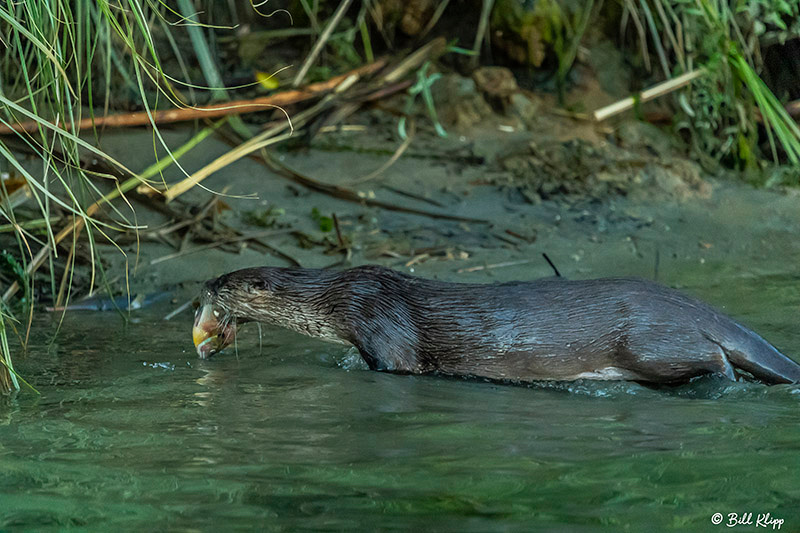 River Otters, Indian Slough, Delta Wanderings, Photos by Bill KlippRiver Otters, Indian Slough, Delta Wanderings, Photos by Bill Klipp
River Otters, Indian Slough, Delta Wanderings, Photos by Bill KlippRiver Otters, Indian Slough, Delta Wanderings, Photos by Bill Klipp
All photos © Bill Klipp, not for Commercial Use of any type, for personal use only.
River Otters are in the Weasel family and have a long slender streamlined body, short legs, stout muscular tapered tail and flat head. Their eyes, ears, and nose are located on the top of their head so they can see, hear and smell while most of their body is submerged in the water. They can weigh 10-30 lbs and are 3-4 feet long.
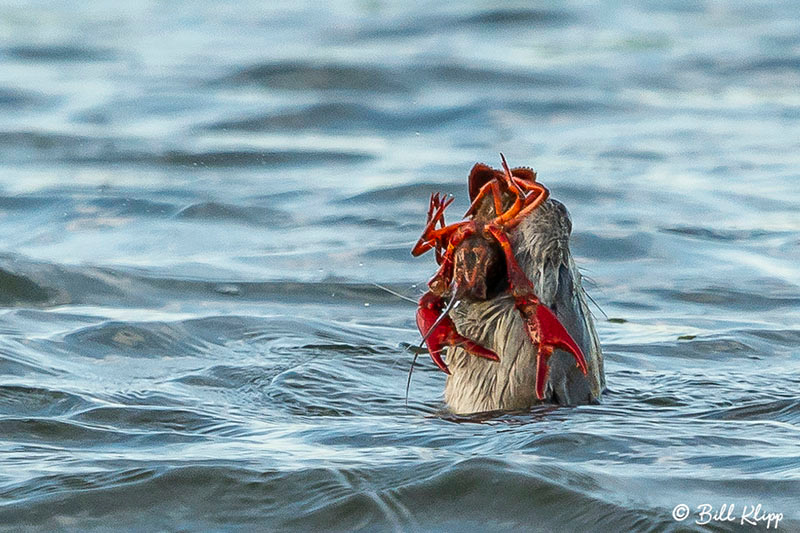 River Otters, Indian Slough, Delta Wanderings, Photos by Bill KlippRiver Otters, Indian Slough, Delta Wanderings, Photos by Bill Klipp
River Otters, Indian Slough, Delta Wanderings, Photos by Bill KlippRiver Otters, Indian Slough, Delta Wanderings, Photos by Bill Klipp
All photos © Bill Klipp, not for Commercial Use of any type, for personal use only.
River Otter with a Crayfish. I always knew we had Crayfish in our local waters but after tracking Otters for hours I know realize we have thousands of them. We watched several romps of Otters catch dozens of them in a few minutes.
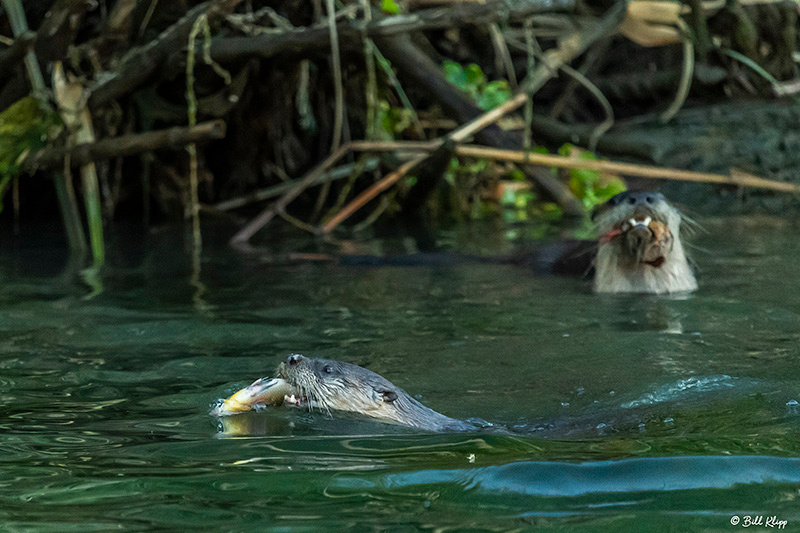 River Otters, Indian Slough, Delta Wanderings, Photos by Bill KlippRiver Otters, Indian Slough, Delta Wanderings, Photos by Bill Klipp
River Otters, Indian Slough, Delta Wanderings, Photos by Bill KlippRiver Otters, Indian Slough, Delta Wanderings, Photos by Bill Klipp
All photos © Bill Klipp, not for Commercial Use of any type, for personal use only.
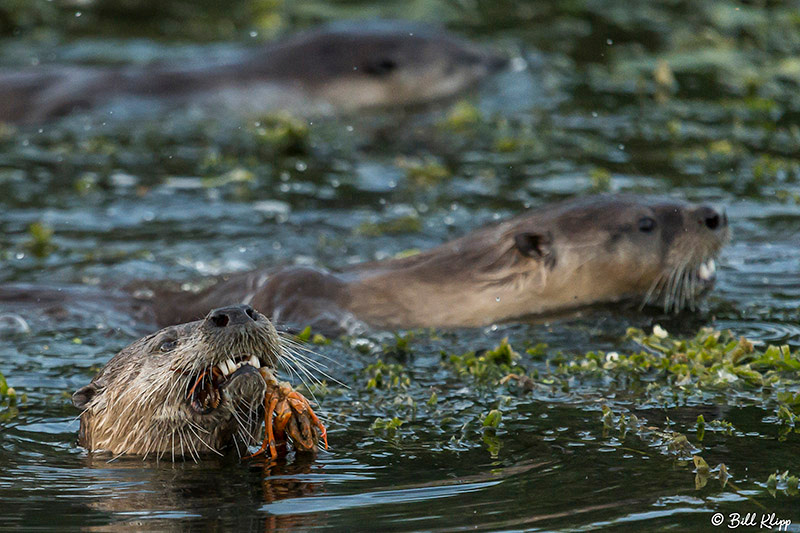 River Otters, Delta Wanderings, Discovery Bay, Photos by Bill KlippRiver Otters, Delta Wanderings, Discovery Bay, Photos by Bill Klipp
River Otters, Delta Wanderings, Discovery Bay, Photos by Bill KlippRiver Otters, Delta Wanderings, Discovery Bay, Photos by Bill Klipp
All photos © Bill Klipp, not for Commercial Use of any type, for personal use only with written permission.
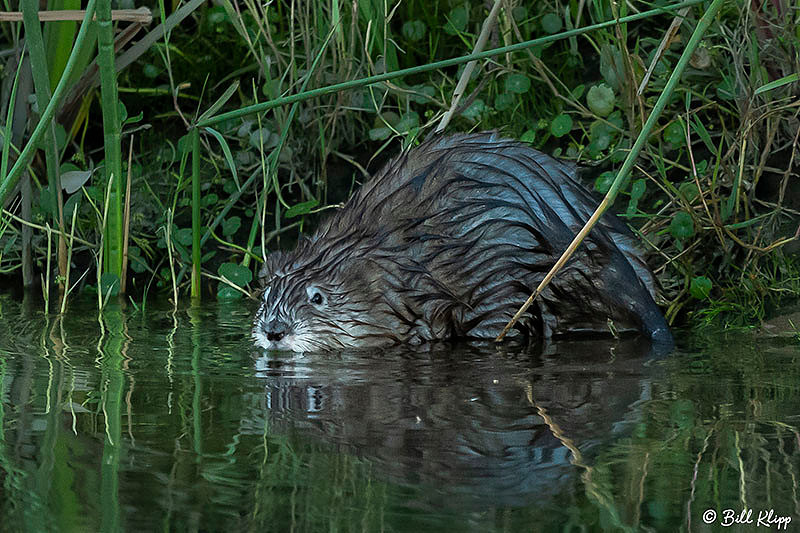 Muskrat, Delta Wanderings, Discovery Bay, Photos by Bill KlippMuskrat, Delta Wanderings, Discovery Bay, Photos by Bill Klipp
Muskrat, Delta Wanderings, Discovery Bay, Photos by Bill KlippMuskrat, Delta Wanderings, Discovery Bay, Photos by Bill Klipp
All photos © Bill Klipp, not for Commercial Use of any type, for personal use only with written permission.
This little guy is a Muskrat often confused with our local Beavers and Otters is the smallest of our semi-aquatic mammals weighing up to 2 lbs and 2 feet long. Muskrats are rodents and are rat like in their appearance with a roundish body and along thin, laterally flat non-hairy tail.
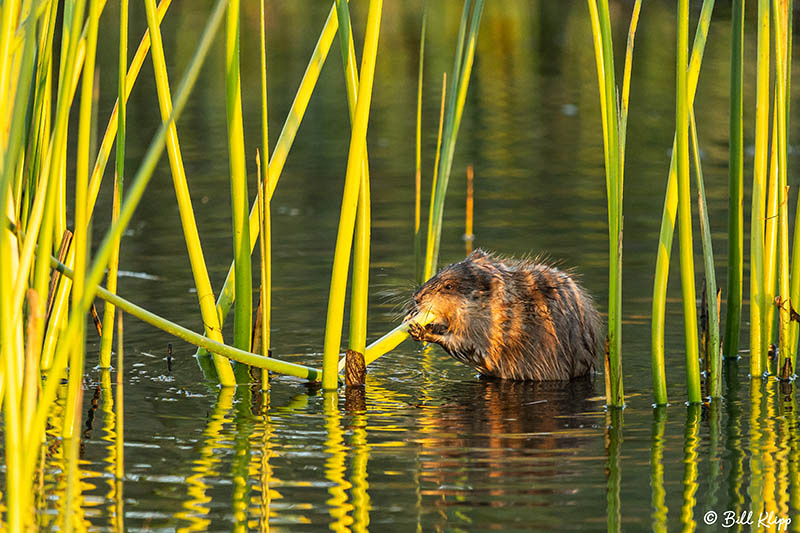 Muskrat, Discovery Bay Photos by Bill KlippMuskrat, Discovery Bay Photos by Bill Klipp
Muskrat, Discovery Bay Photos by Bill KlippMuskrat, Discovery Bay Photos by Bill Klipp
All photos © Bill Klipp, not for Commercial Use of any type, for personal use only.
When eating you will notice their distinctive classic herbivore teeth like a Beaver. Their front feet are distinctively smaller than their rear feet and are used mostly for digging and feeding
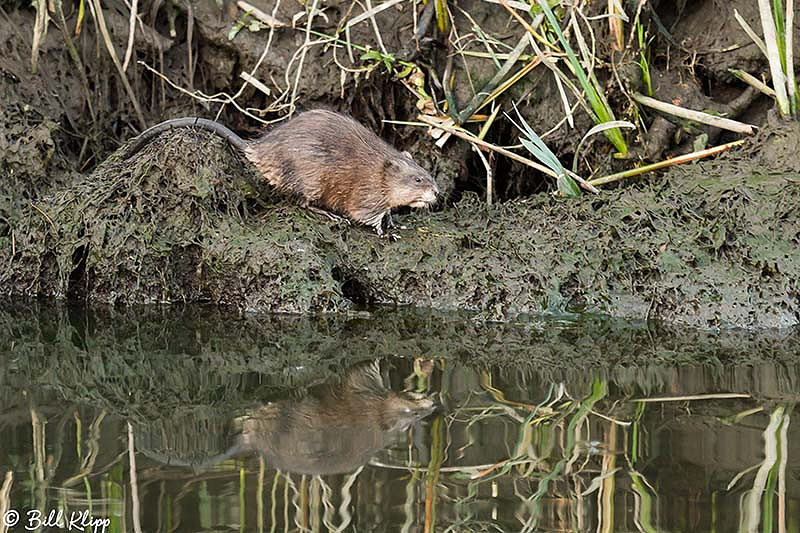 Discovery Bay Photos by Bill KlippAll photos © Bill Klipp, not for Commercial Use of any type, for personal use only.
Discovery Bay Photos by Bill KlippAll photos © Bill Klipp, not for Commercial Use of any type, for personal use only.
Shore Birds
Discovery Bay Photos by Bill Klipp
Muskrats are rat like in appearance, note the den entrance in the mud bank
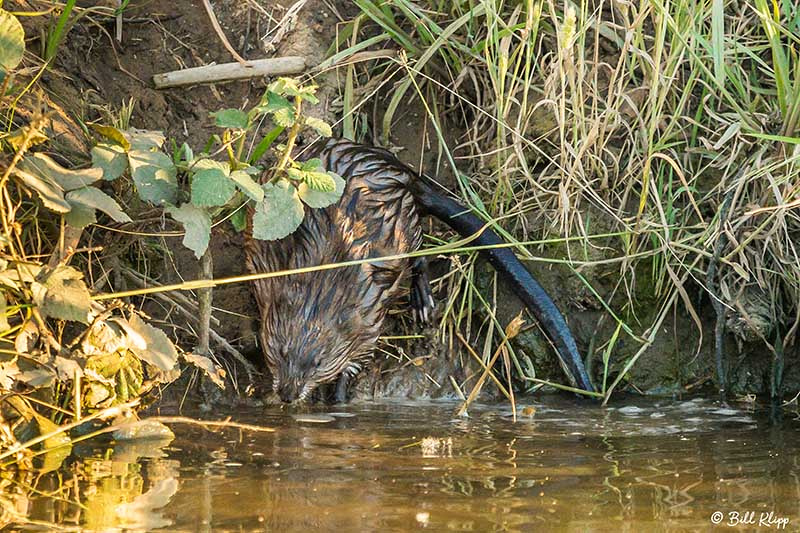 Muskrat, Discovery Bay, Photos by Bill KlippMuskrat, Discovery Bay, Photos by Bill Klipp
Muskrat, Discovery Bay, Photos by Bill KlippMuskrat, Discovery Bay, Photos by Bill Klipp
All photos © Bill Klipp, not for Commercial Use of any type, for personal use only.
Notice the shape and how long the Muskrat's tail is
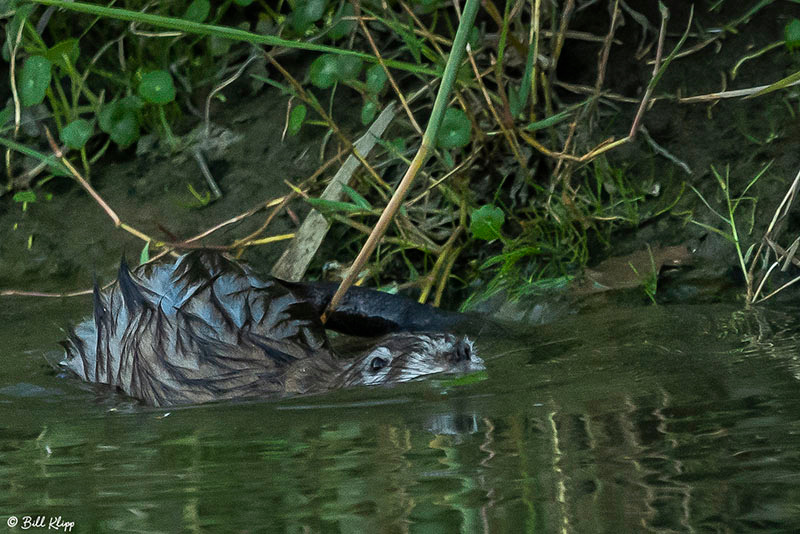 Muskrat, Delta Wanderings, Discovery Bay, Photos by Bill KlippMuskrat, Delta Wanderings, Discovery Bay, Photos by Bill Klipp
Muskrat, Delta Wanderings, Discovery Bay, Photos by Bill KlippMuskrat, Delta Wanderings, Discovery Bay, Photos by Bill Klipp
All photos © Bill Klipp, not for Commercial Use of any type, for personal use only with written permission.
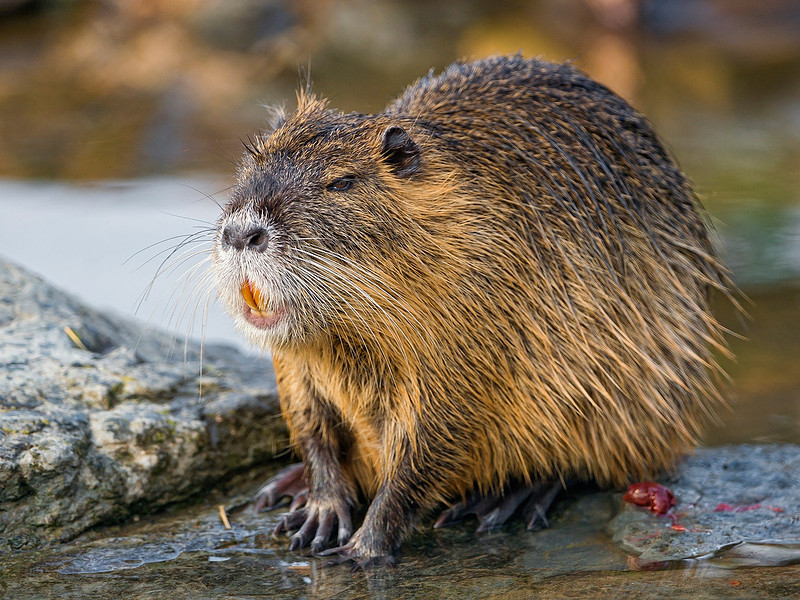
 Invasive Nutria are large semi-aquatic rodents resembling Beavers and are native to South America. I have not yet seen one or evidence of one near Discovery Bay "yet", but I thought I would post a photo in case someone spots one. They sometimes live in large colonies and reproduce prolifically having 2-3 litters per year. They are light to dark brown with a robust body, short limbs, small eyes and ears, long white whiskers with a cylindrical, scaly sparely haired tail. With a body length of 2 feet and a tail 1-1.5 feet long they weigh between 15-20 lbs. Smaller than a Beaver and larger than a Muskrat. Their white muzzle and whiskers are tell tail characteristics. These guys are invasive to the Delta and can cause extreme damage to our envirornment. Photo from internet. To learn more about the check out this link: Nutria
Invasive Nutria are large semi-aquatic rodents resembling Beavers and are native to South America. I have not yet seen one or evidence of one near Discovery Bay "yet", but I thought I would post a photo in case someone spots one. They sometimes live in large colonies and reproduce prolifically having 2-3 litters per year. They are light to dark brown with a robust body, short limbs, small eyes and ears, long white whiskers with a cylindrical, scaly sparely haired tail. With a body length of 2 feet and a tail 1-1.5 feet long they weigh between 15-20 lbs. Smaller than a Beaver and larger than a Muskrat. Their white muzzle and whiskers are tell tail characteristics. These guys are invasive to the Delta and can cause extreme damage to our envirornment. Photo from internet. To learn more about the check out this link: Nutria
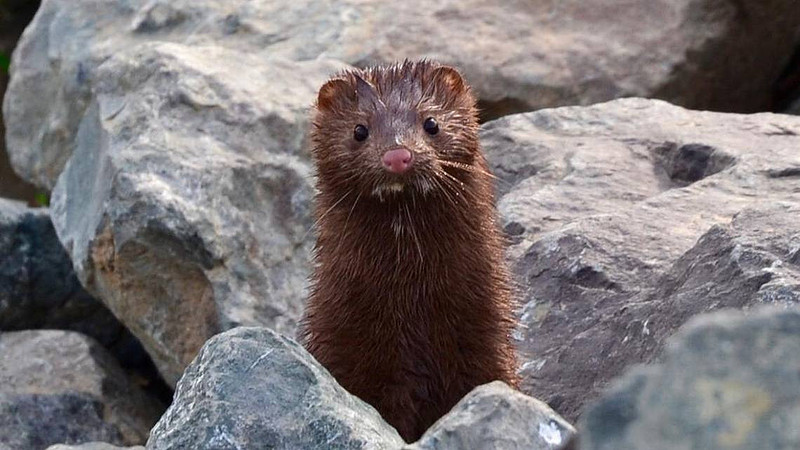

Little known and rarely seen we also have Mink in the Delta. I have only seen one years ago in the rip rap near the Marina. They are cute little ferret like, dark-colored, semiaquatic, carnivorous mammals that live usually in the rocks along the shoreline. Photo from internet
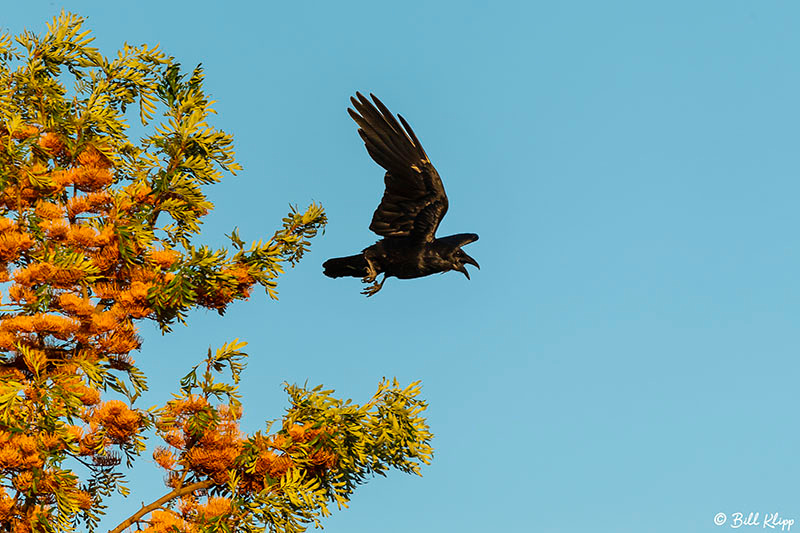 Delta Wanderings, Discovery Bay, Photos by Bill KlippDelta Wanderings, Discovery Bay, Photos by Bill Klipp
Delta Wanderings, Discovery Bay, Photos by Bill KlippDelta Wanderings, Discovery Bay, Photos by Bill Klipp
All photos © Bill Klipp, not for Commercial Use of any type, for personal use only with written permission.
Common Crow
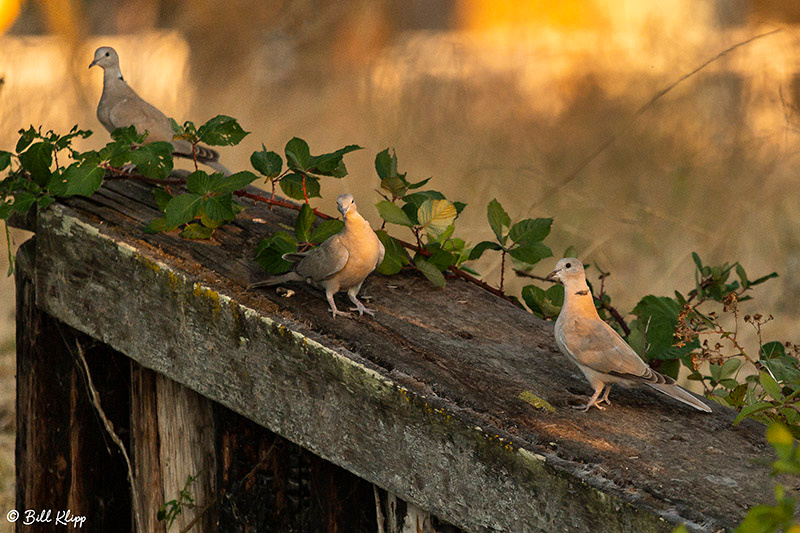 Eurasian Collared Dove, Delta Wanderings, Discovery Bay Photos bEurasian Collared Dove, Delta Wanderings, Discovery Bay Photos by Bill Klipp
Eurasian Collared Dove, Delta Wanderings, Discovery Bay Photos bEurasian Collared Dove, Delta Wanderings, Discovery Bay Photos by Bill Klipp
All photos © Bill Klipp, not for Commercial Use of any type, for personal use only.
Eurasian Collared Doves
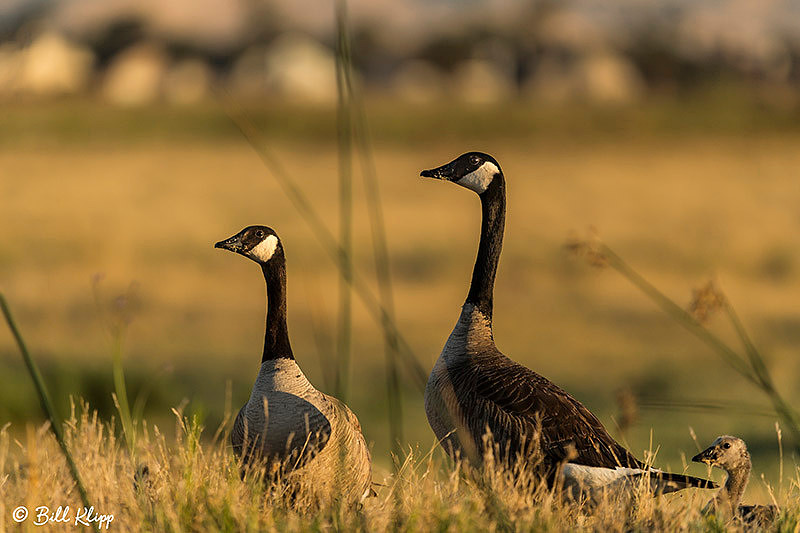 Canada Geese, Delta Wanderings, Discovery Bay, Photos by Bill KlippCanada Geese, Delta Wanderings, Discovery Bay, Photos by Bill Klipp
Canada Geese, Delta Wanderings, Discovery Bay, Photos by Bill KlippCanada Geese, Delta Wanderings, Discovery Bay, Photos by Bill Klipp
All photos © Bill Klipp, not for Commercial Use of any type, for personal use only with written permission.
Canada Geese
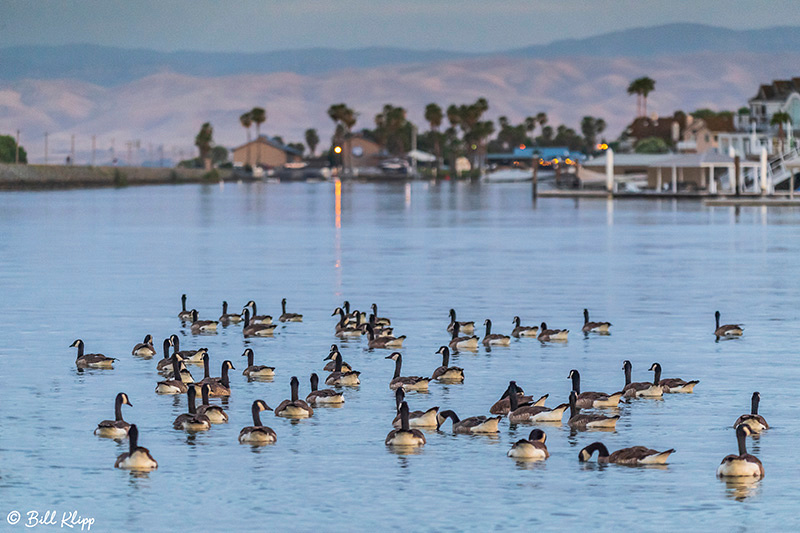 Canada Geese, Delta Wanderings, Discovery Bay, Photos by Bill KlippCanada Geese, Delta Wanderings, Discovery Bay, Photos by Bill Klipp
Canada Geese, Delta Wanderings, Discovery Bay, Photos by Bill KlippCanada Geese, Delta Wanderings, Discovery Bay, Photos by Bill Klipp
All photos © Bill Klipp, not for Commercial Use of any type, for personal use only with written permission.
Canada Geese
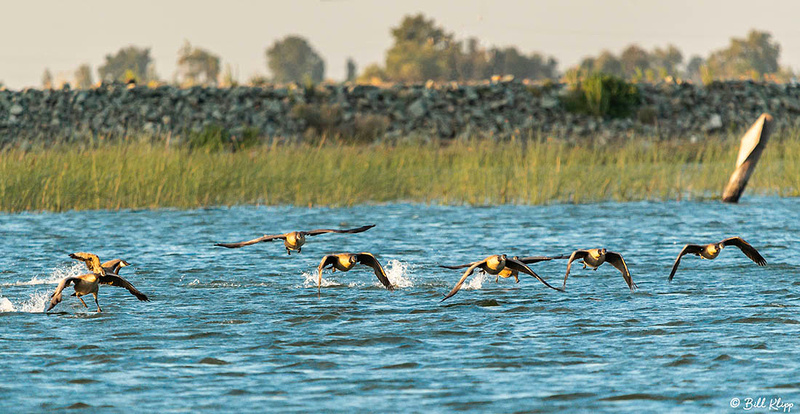 Canada Geese, Delta Wanderings, Discovery Bay, Photos by Bill KlippCanada Geese, Delta Wanderings, Discovery Bay, Photos by Bill Klipp
Canada Geese, Delta Wanderings, Discovery Bay, Photos by Bill KlippCanada Geese, Delta Wanderings, Discovery Bay, Photos by Bill Klipp
All photos © Bill Klipp, not for Commercial Use of any type, for personal use only with written permission.
Canada Geese
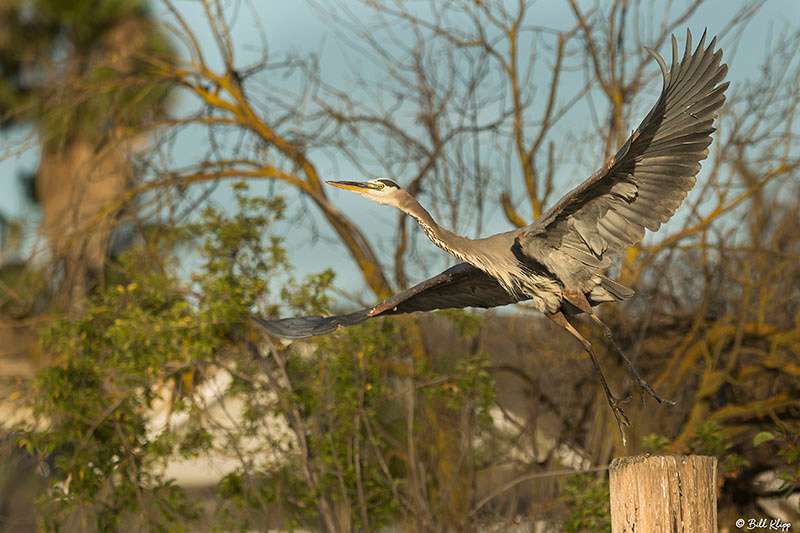 Great Blue Heron, Delta Wanderings, Discovery Bay, Photos by Bill KlippGreat Blue Heron, Delta Wanderings, Discovery Bay, Photos by Bill Klipp
Great Blue Heron, Delta Wanderings, Discovery Bay, Photos by Bill KlippGreat Blue Heron, Delta Wanderings, Discovery Bay, Photos by Bill Klipp
All photos © Bill Klipp, not for Commercial Use of any type, for personal use only with written permission.
Great Blue Heron
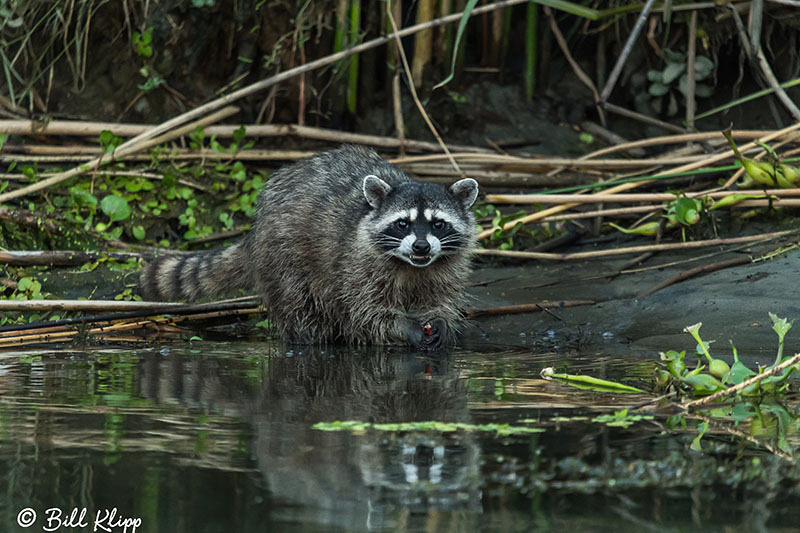 Discovery Bay, Photos by Bill KlippRaccoon, Discovery Bay, Photos by Bill Klipp
Discovery Bay, Photos by Bill KlippRaccoon, Discovery Bay, Photos by Bill Klipp
Mammals_Disco_Bay_Raccoon_BKlipp_July_2018_5_.NEF
All photos © Bill Klipp, not for Commercial Use of any type, for personal use only.
Raccoon munching on a Crayfish
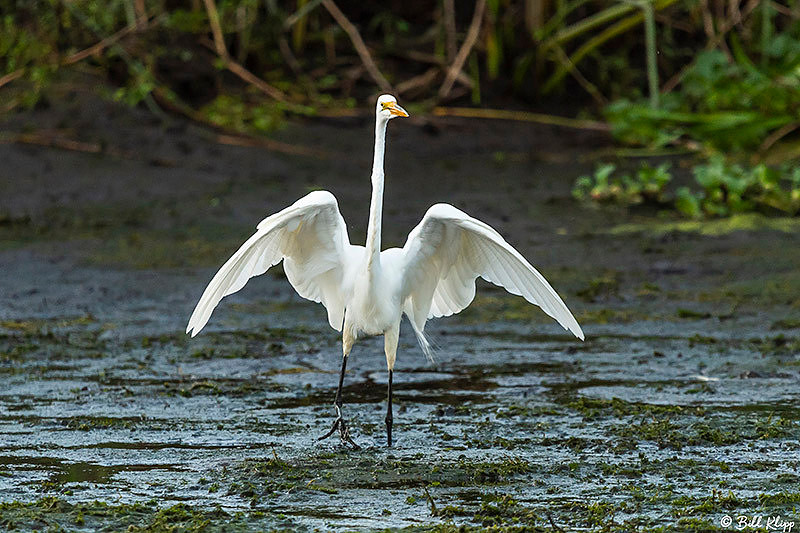 Great Egret, Delta Wanderings, Discovery Bay, Photos by Bill KlippGreat Egret, Delta Wanderings, Discovery Bay, Photos by Bill Klipp
Great Egret, Delta Wanderings, Discovery Bay, Photos by Bill KlippGreat Egret, Delta Wanderings, Discovery Bay, Photos by Bill Klipp
All photos © Bill Klipp, not for Commercial Use of any type, for personal use only with written permission.
Great Egret
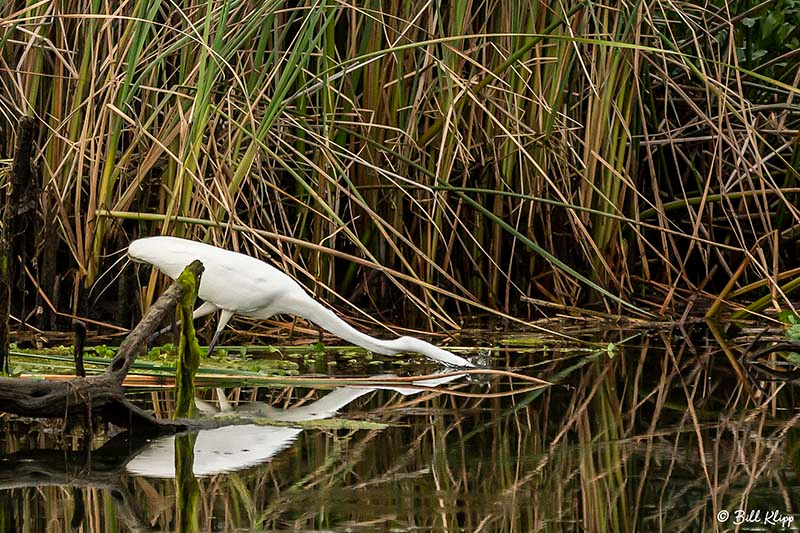 Great Egret, Delta Wanderings, Discovery Bay, Photos by Bill KlippGreat Egret, Delta Wanderings, Discovery Bay, Photos by Bill Klipp
Great Egret, Delta Wanderings, Discovery Bay, Photos by Bill KlippGreat Egret, Delta Wanderings, Discovery Bay, Photos by Bill Klipp
All photos © Bill Klipp, not for Commercial Use of any type, for personal use only with written permission.
Great Egret fishing
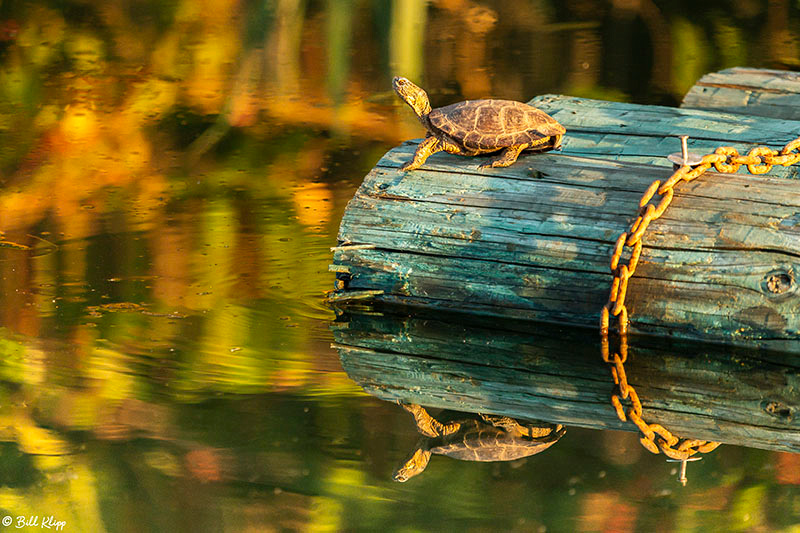 Western Pond Turtle, Delta Wanderings, Discovery Bay, Photos byWestern Pond Turtle, Delta Wanderings, Discovery Bay, Photos by Bill Klipp
Western Pond Turtle, Delta Wanderings, Discovery Bay, Photos byWestern Pond Turtle, Delta Wanderings, Discovery Bay, Photos by Bill Klipp
All photos © Bill Klipp, not for Commercial Use of any type, for personal use only with written permission.
Western Pond Turtle
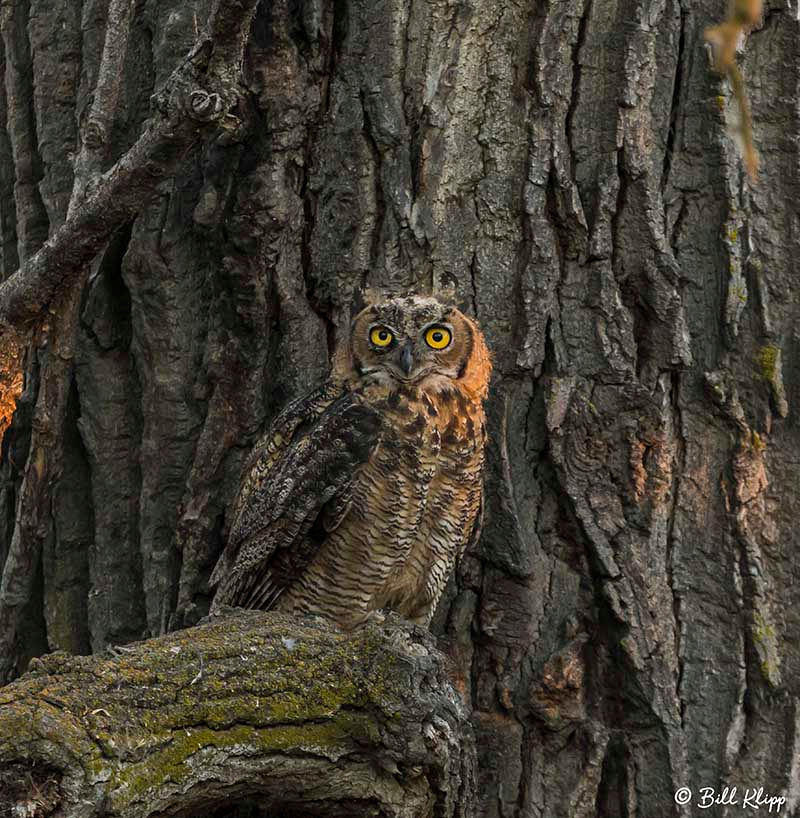 Great Horned Owl, Discovery Bay, Photos by Bill KlippGreat Horned Owl, Discovery Bay, Photos by Bill Klipp
Great Horned Owl, Discovery Bay, Photos by Bill KlippGreat Horned Owl, Discovery Bay, Photos by Bill Klipp
Birds_Disco_Bay_Great_Horned_Owl_BKlipp_July_2018_1_.NEF
All photos © Bill Klipp, not for Commercial Use of any type, for personal use only.
Great Horned Owl
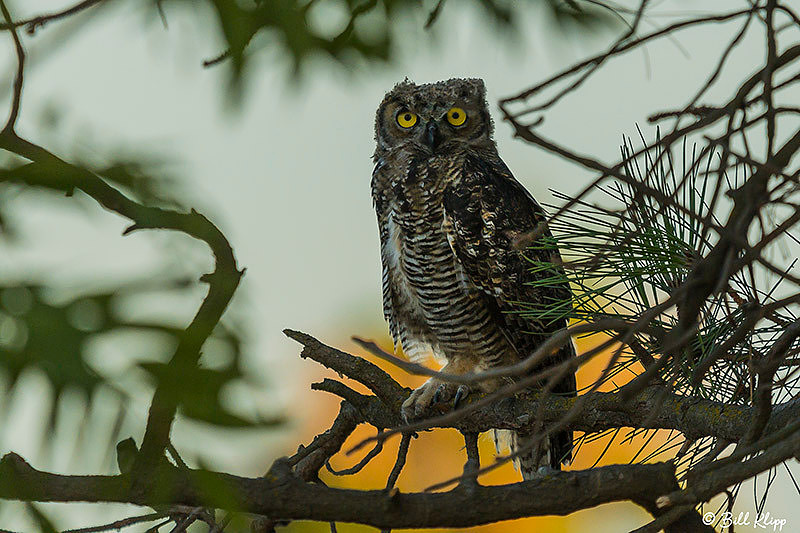 Great Horned Owl, Delta Wanderings, Discovery Bay, Photos by BilGreat Horned Owl, Delta Wanderings, Discovery Bay, Photos by Bill Klipp
Great Horned Owl, Delta Wanderings, Discovery Bay, Photos by BilGreat Horned Owl, Delta Wanderings, Discovery Bay, Photos by Bill Klipp
All photos © Bill Klipp, not for Commercial Use of any type, for personal use only with written permission.
Great Horned Owl
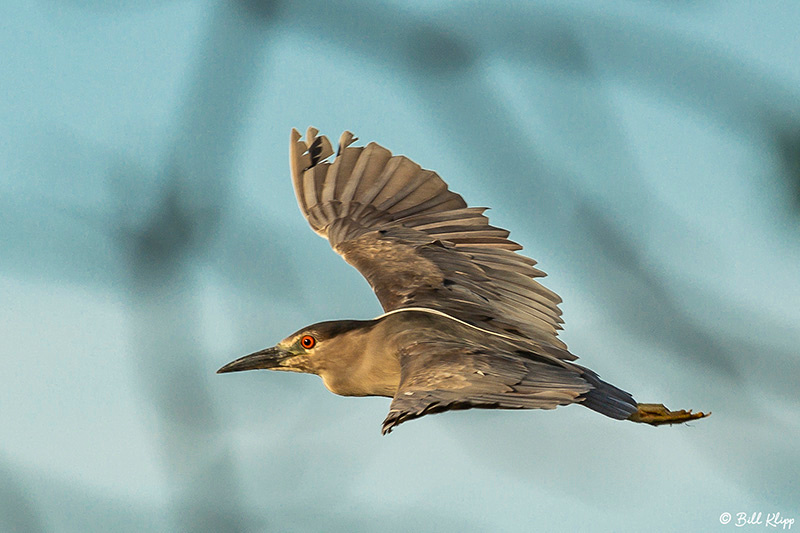 Night Heron, Delta Wanderings, Discovery Bay, Photos by Bill KlippNight Heron, Delta Wanderings, Discovery Bay, Photos by Bill Klipp
Night Heron, Delta Wanderings, Discovery Bay, Photos by Bill KlippNight Heron, Delta Wanderings, Discovery Bay, Photos by Bill Klipp
All photos © Bill Klipp, not for Commercial Use of any type, for personal use only with written permission.
Black Crowned Night Heron
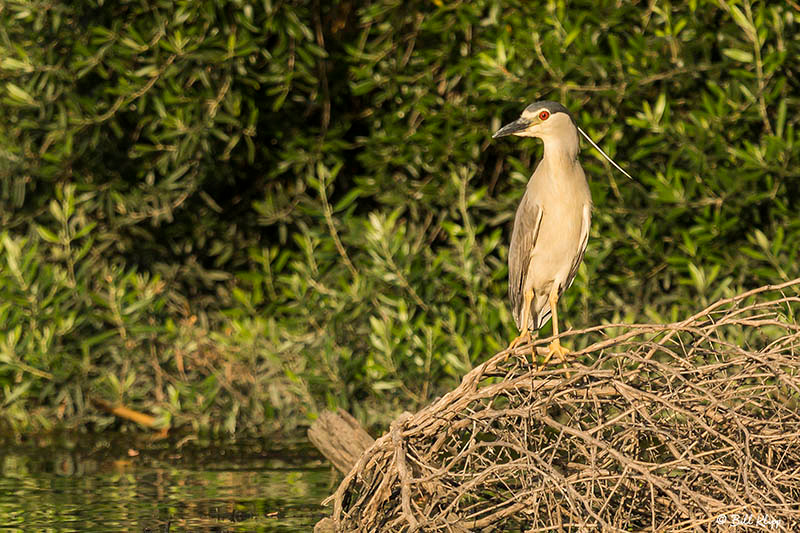 Night Heron, Delta Wanderings, Discovery Bay, Photos by Bill KlippNight Heron, Delta Wanderings, Discovery Bay, Photos by Bill Klipp
Night Heron, Delta Wanderings, Discovery Bay, Photos by Bill KlippNight Heron, Delta Wanderings, Discovery Bay, Photos by Bill Klipp
All photos © Bill Klipp, not for Commercial Use of any type, for personal use only with written permission.
Black Crowned Night Heron
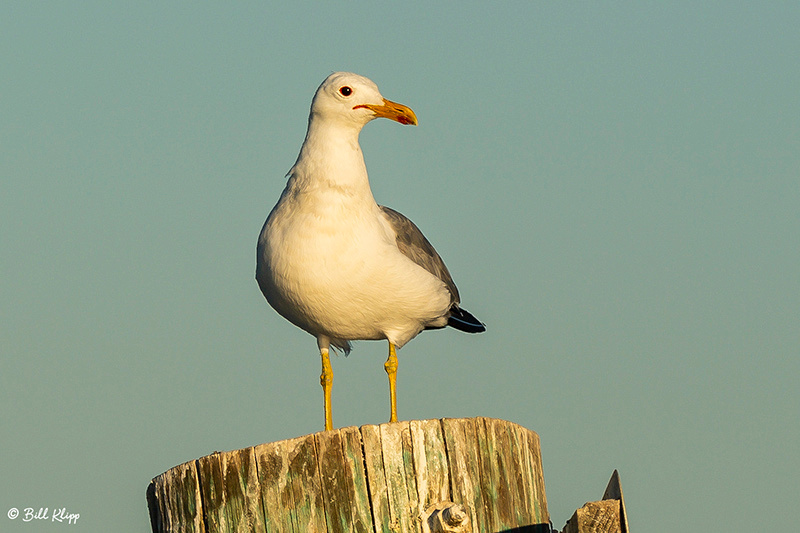 California Gull, Delta Wanderings, Discovery Bay, Photos by BillCalifornia Gull, Delta Wanderings, Discovery Bay, Photos by Bill Klipp
California Gull, Delta Wanderings, Discovery Bay, Photos by BillCalifornia Gull, Delta Wanderings, Discovery Bay, Photos by Bill Klipp
All photos © Bill Klipp, not for Commercial Use of any type, for personal use only with written permission.
Gulls are often thought of as coastal birds, but California Gulls are also common in inland areas in the West. Breeding adult California Gulls are white-headed gulls with a medium gray back, yellow legs, and a dark eye. Nonbreeding adults have brown streaking on the head.
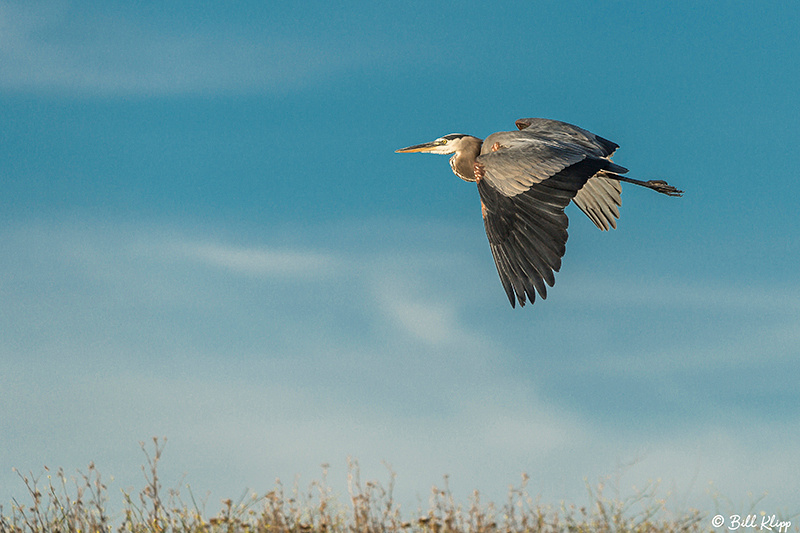 Great Blue Heron, Delta Wanderings, Discovery Bay, Photos by Bill KlippGreat Blue Heron, Delta Wanderings, Discovery Bay, Photos by Bill Klipp
Great Blue Heron, Delta Wanderings, Discovery Bay, Photos by Bill KlippGreat Blue Heron, Delta Wanderings, Discovery Bay, Photos by Bill Klipp
All photos © Bill Klipp, not for Commercial Use of any type, for personal use only with written permission.
Great Blue Heron
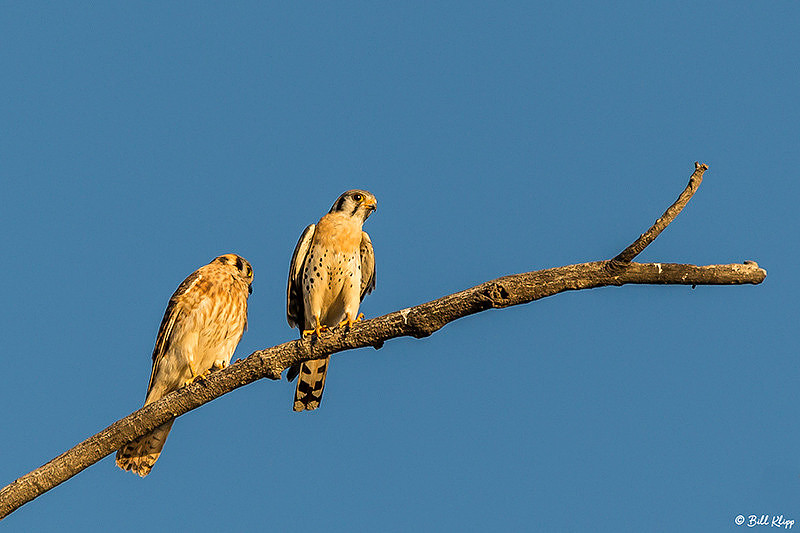 Delta Wanderings, Discovery Bay, Photos by Bill KlippDelta Wanderings, Discovery Bay, Photos by Bill Klipp
Delta Wanderings, Discovery Bay, Photos by Bill KlippDelta Wanderings, Discovery Bay, Photos by Bill Klipp
All photos © Bill Klipp, not for Commercial Use of any type, for personal use only with written permission.
American Kestrels
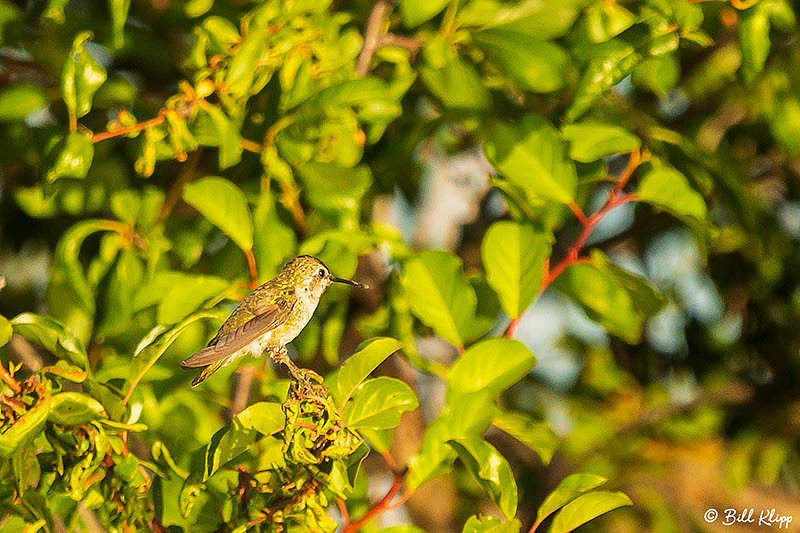 Humming Bird, Delta Wanderings, Discovery Bay, Photos by Bill KlippHumming Bird, Delta Wanderings, Discovery Bay, Photos by Bill Klipp
Humming Bird, Delta Wanderings, Discovery Bay, Photos by Bill KlippHumming Bird, Delta Wanderings, Discovery Bay, Photos by Bill Klipp
All photos © Bill Klipp, not for Commercial Use of any type, for personal use only with written permission.
Hummingbird
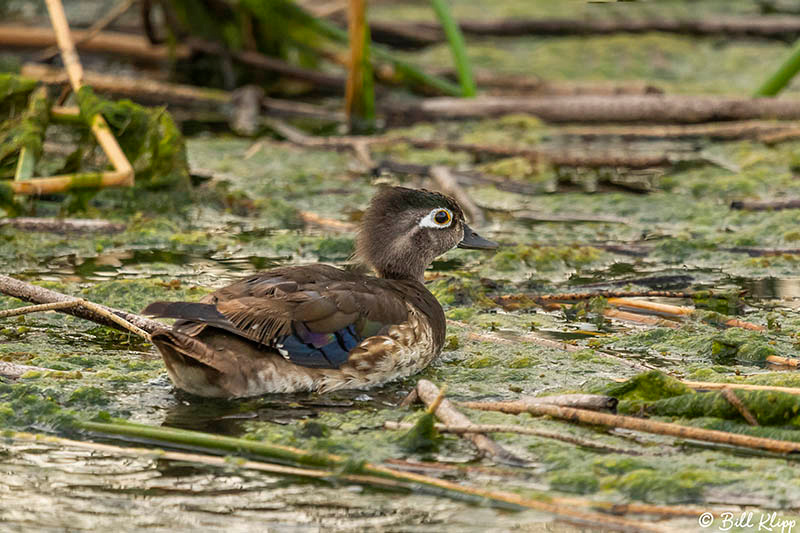 Wood Ducks, Delta Wanderings, Discovery Bay, Photos by Bill KlippWood Ducks, Delta Wanderings, Discovery Bay, Photos by Bill Klipp
Wood Ducks, Delta Wanderings, Discovery Bay, Photos by Bill KlippWood Ducks, Delta Wanderings, Discovery Bay, Photos by Bill Klipp
All photos © Bill Klipp, not for Commercial Use of any type, for personal use only with written permission.
Baby Wood Duck
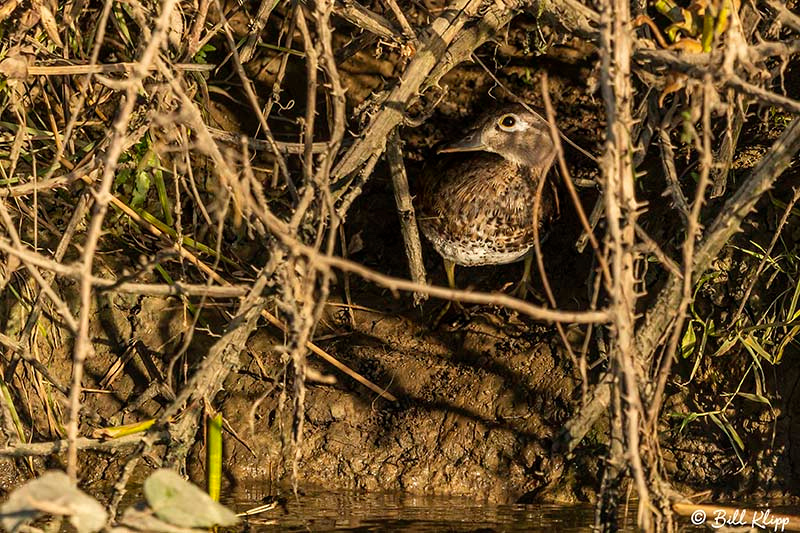 Wood Ducks, Delta Wanderings, Discovery Bay, Photos by Bill KlippWood Ducks, Delta Wanderings, Discovery Bay, Photos by Bill Klipp
Wood Ducks, Delta Wanderings, Discovery Bay, Photos by Bill KlippWood Ducks, Delta Wanderings, Discovery Bay, Photos by Bill Klipp
All photos © Bill Klipp, not for Commercial Use of any type, for personal use only with written permission.
Wood Duck hiding in nest
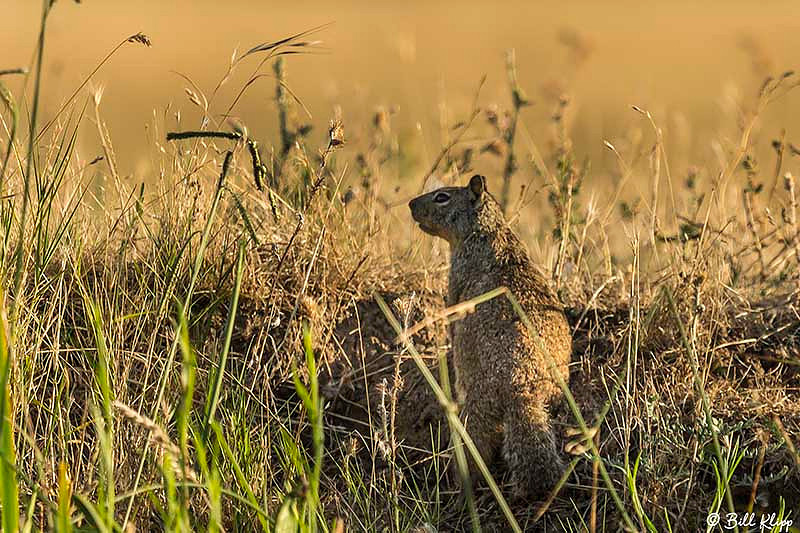 Ground Squirrel, Delta Wanderings, Discovery Bay, Photos by Bill KlippGround Squirrel, Delta Wanderings, Discovery Bay, Photos by Bill Klipp
Ground Squirrel, Delta Wanderings, Discovery Bay, Photos by Bill KlippGround Squirrel, Delta Wanderings, Discovery Bay, Photos by Bill Klipp
All photos © Bill Klipp, not for Commercial Use of any type, for personal use only with written permission.
Ground Squirrel
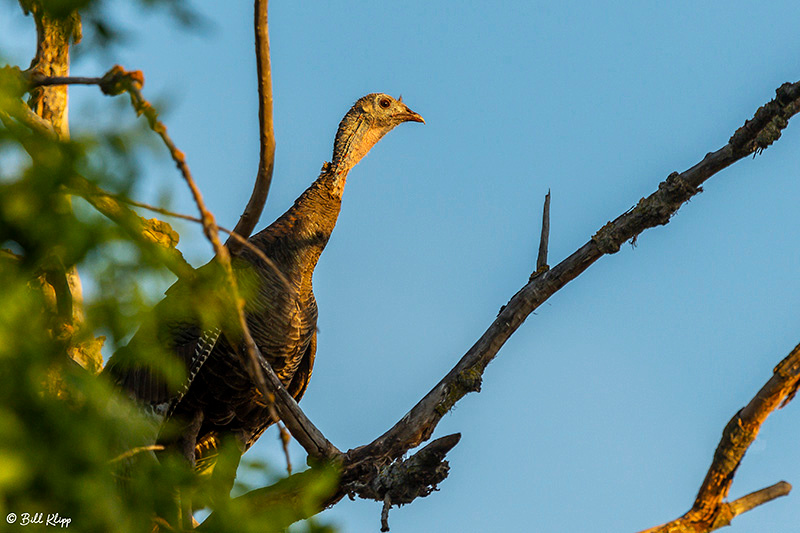 Wild Turkey, Delta Wanderings, Discovery Bay, Photos by Bill KlippWild Turkey, Delta Wanderings, Discovery Bay, Photos by Bill Klipp
Wild Turkey, Delta Wanderings, Discovery Bay, Photos by Bill KlippWild Turkey, Delta Wanderings, Discovery Bay, Photos by Bill Klipp
All photos © Bill Klipp, not for Commercial Use of any type, for personal use only with written permission.
Wild Turkey
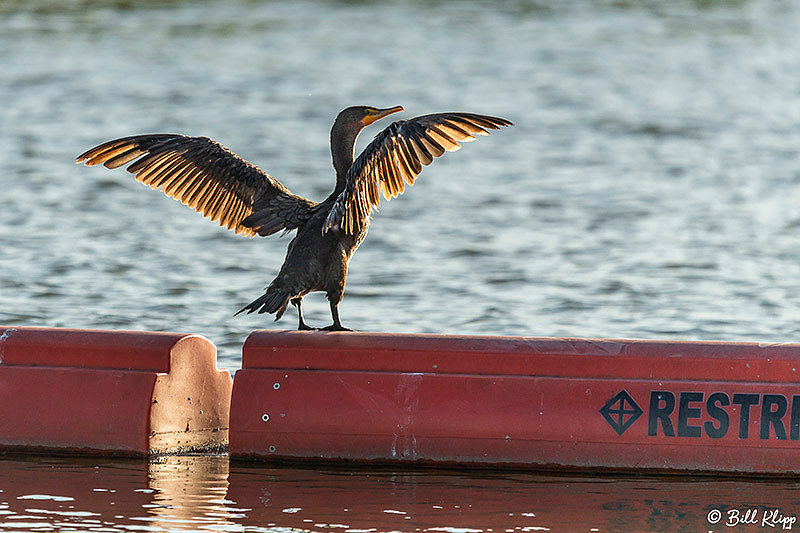 Cormorant, Delta Wanderings, Discovery Bay, Photos by Bill KlippCormorant, Delta Wanderings, Discovery Bay, Photos by Bill Klipp
Cormorant, Delta Wanderings, Discovery Bay, Photos by Bill KlippCormorant, Delta Wanderings, Discovery Bay, Photos by Bill Klipp
All photos © Bill Klipp, not for Commercial Use of any type, for personal use only with written permission.
Cormorant drying its wings
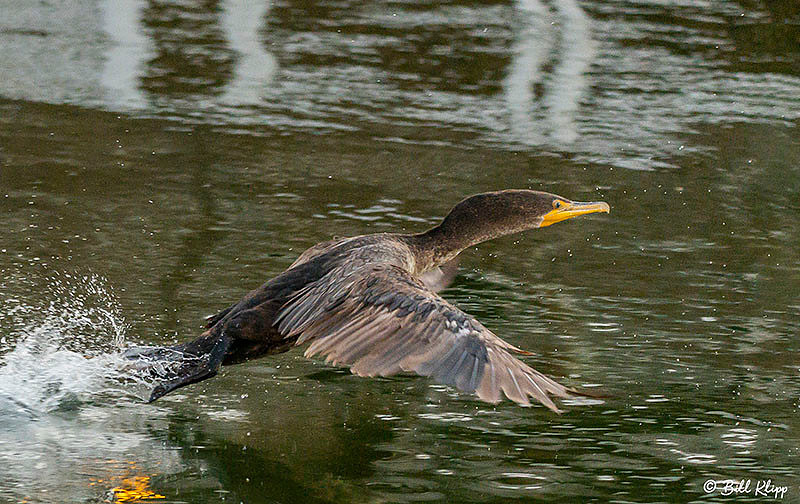 Cormorant, Delta Wanderings, Discovery Bay, Photos by Bill KlippCormorant, Delta Wanderings, Discovery Bay, Photos by Bill Klipp
Cormorant, Delta Wanderings, Discovery Bay, Photos by Bill KlippCormorant, Delta Wanderings, Discovery Bay, Photos by Bill Klipp
All photos © Bill Klipp, not for Commercial Use of any type, for personal use only with written permission.
Cormorant taking flight
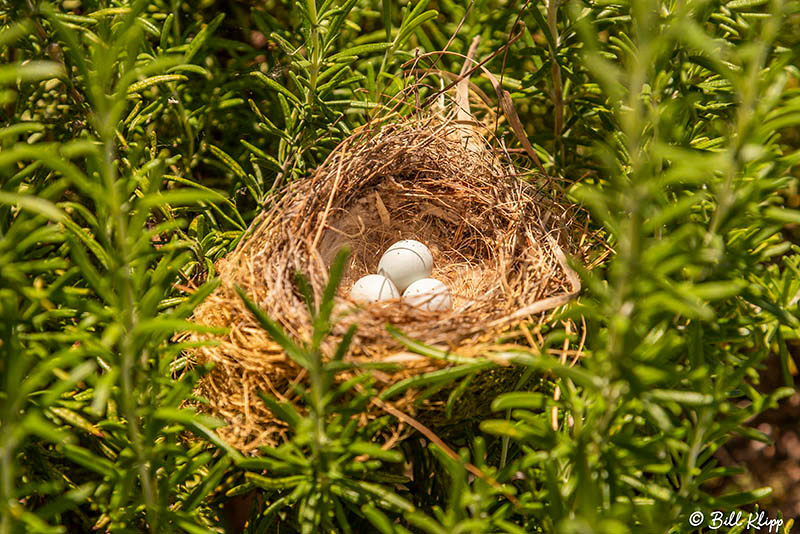 Sparrow Nest, Delta Wanderings, Discovery Bay, Photos by Bill KlippSparrow Nest, Delta Wanderings, Discovery Bay, Photos by Bill Klipp
Sparrow Nest, Delta Wanderings, Discovery Bay, Photos by Bill KlippSparrow Nest, Delta Wanderings, Discovery Bay, Photos by Bill Klipp
All photos © Bill Klipp, not for Commercial Use of any type, for personal use only with written permission.
Sparrow nest
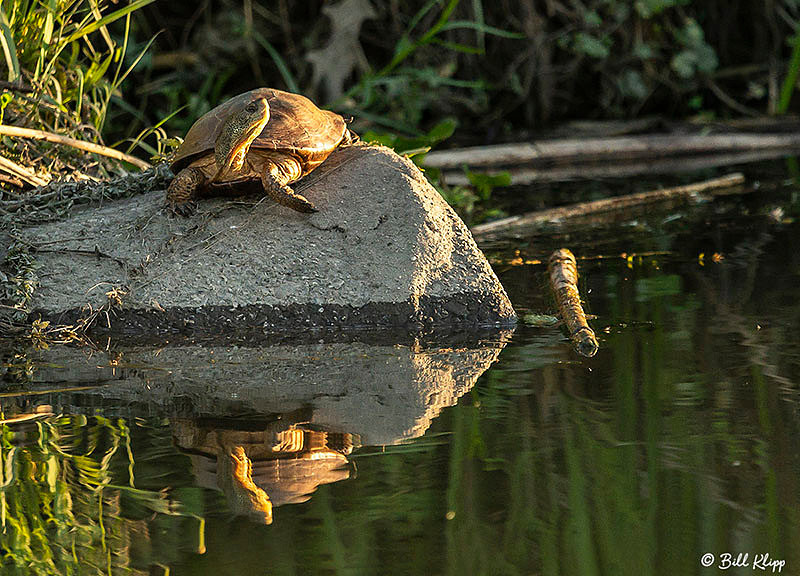 Western Pond Turtle, Delta Wanderings, Discovery Bay, Photos by Bill KlippWestern Pond Turtle, Delta Wanderings, Discovery Bay, Photos by Bill Klipp
Western Pond Turtle, Delta Wanderings, Discovery Bay, Photos by Bill KlippWestern Pond Turtle, Delta Wanderings, Discovery Bay, Photos by Bill Klipp
All photos © Bill Klipp, not for Commercial Use of any type, for personal use only with written permission.
Western Pond Turtle
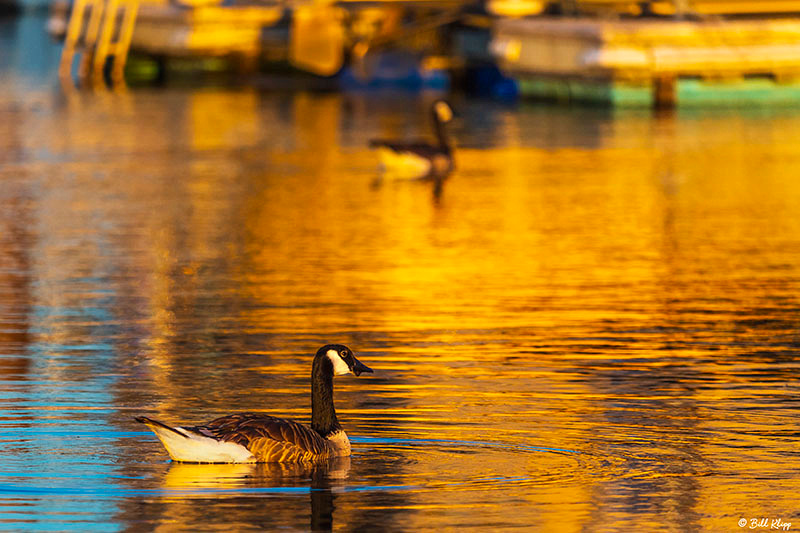 Canada Geese, Delta Wanderings, Discovery Bay, Photos by Bill KlippCanada Geese, Delta Wanderings, Discovery Bay, Photos by Bill Klipp
Canada Geese, Delta Wanderings, Discovery Bay, Photos by Bill KlippCanada Geese, Delta Wanderings, Discovery Bay, Photos by Bill Klipp
All photos © Bill Klipp, not for Commercial Use of any type, for personal use only with written permission.
Canada Geese
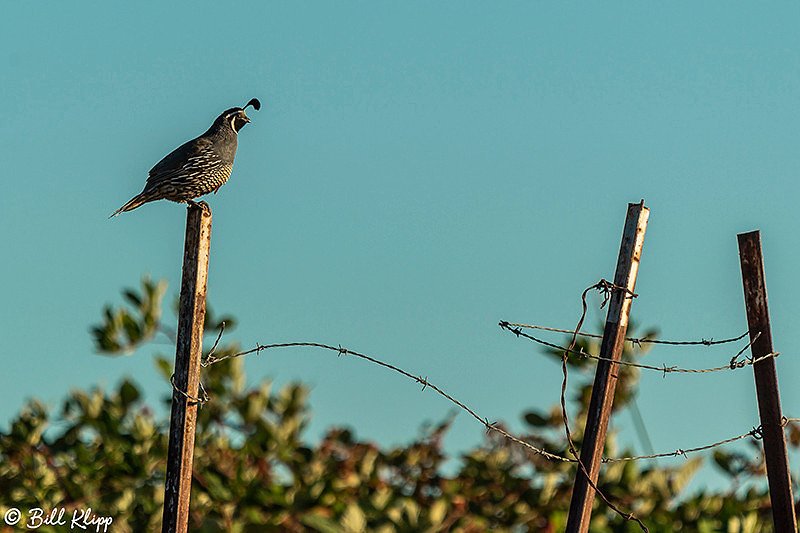 California Quail, Delta Wanderings, Discovery Bay, Photos by Bill KlippCalifornia Quail, Delta Wanderings, Discovery Bay, Photos by Bill Klipp
California Quail, Delta Wanderings, Discovery Bay, Photos by Bill KlippCalifornia Quail, Delta Wanderings, Discovery Bay, Photos by Bill Klipp
All photos © Bill Klipp, not for Commercial Use of any type, for personal use only with written permission.
California Quail
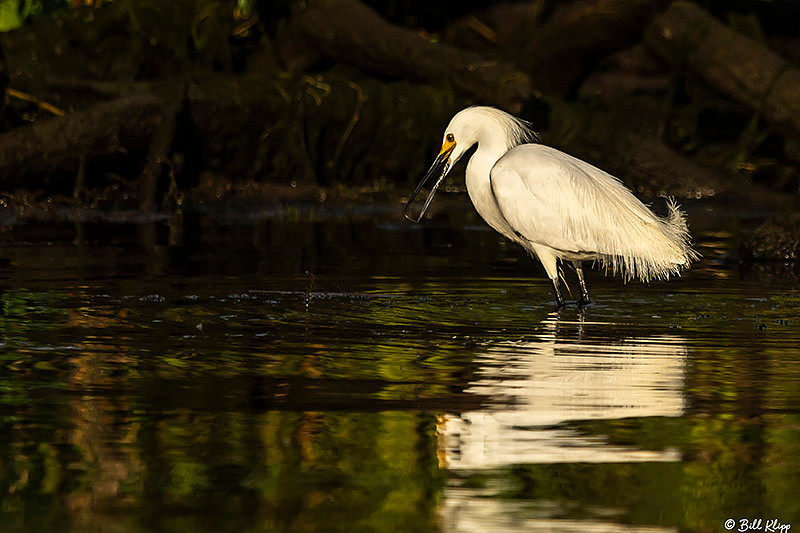 Snowy Egret, Delta Wanderings, Discovery Bay, Photos by Bill KlippSnowy Egret, Delta Wanderings, Discovery Bay, Photos by Bill Klipp
Snowy Egret, Delta Wanderings, Discovery Bay, Photos by Bill KlippSnowy Egret, Delta Wanderings, Discovery Bay, Photos by Bill Klipp
All photos © Bill Klipp, not for Commercial Use of any type, for personal use only with written permission.
Snowy Egret
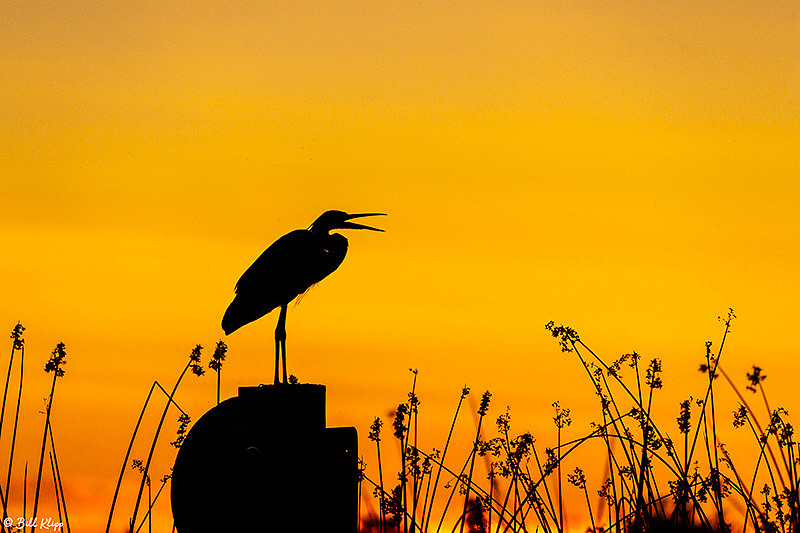 Great Blue Heron Sunset, Delta Wanderings, Discovery Bay, Photos by Bill KlippGreat Blue Heron Sunset, Delta Wanderings, Discovery Bay, Photos by Bill Klipp
Great Blue Heron Sunset, Delta Wanderings, Discovery Bay, Photos by Bill KlippGreat Blue Heron Sunset, Delta Wanderings, Discovery Bay, Photos by Bill Klipp
All photos © Bill Klipp, not for Commercial Use of any type, for personal use only with written permission.
Great Blue Heron Sunset
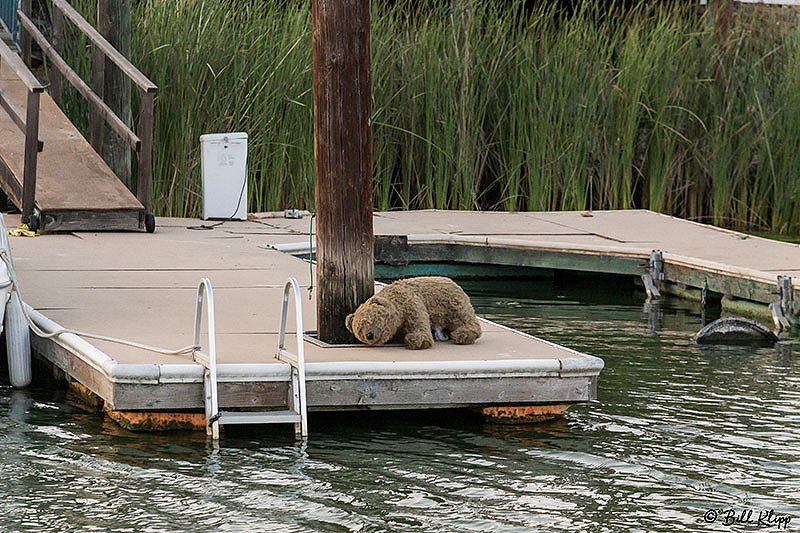 Boating Discovery Bay Photos by Bill KlippBoating Discovery Bay Photos by Bill Klipp
Boating Discovery Bay Photos by Bill KlippBoating Discovery Bay Photos by Bill Klipp
All photos © Bill Klipp, not for Commercial Use of any type, for personal use only with written permission.
Tragedy struck Discovery Bay again as another young Bear was found dead on a dock near the Marina. Authorities from Fish and Wildlife are looking into the recent increase in local Bear deaths.
Delta Bears are pretty common in Northern California. They were once called Midget Bears but the PC Police changed their name to Dock Bears. They are very good swimmers and are rarely seen as they are nocturnal. They are very shy and there have been no reported attacks on humans or their pets. But the spate recent deaths has been alarming.
If you missed my last "Delta Wanderings" #1 blog post -- Click Here: Delta Living
For more photos visit Bill’s Discovery Bay & Delta website: http://DiscoveryBay.me
© Bill Klipp 2019
Check out my online Photo Website at: http://www.DiscoveryBay.me or http://www.wkimages.net
http://www.videos.wkimages.net / All Rights Reserved Bill Klipp
* Any use of these images requires the prior written permission of Bill Klipp the photographer, no other uses of any kind including print or electronic are permitted without the prior written permission of the photographer.
